#i know the naivete is part of his character arc
Explore tagged Tumblr posts
Text
Oooo watched most of ep 2 of Not Me on my lunch break, maybe i am into this show?????
#this kid did no research before impersonating his brother and it is KILLING me#i know the naivete is part of his character arc#and he's gonna become at least a socialist#which like i am here for#love that we burned down a billionaires shitty mansion#HOWEVER#white is borderline tstl and it's testing me
0 notes
Note
Doesn't Two in One kind of really just reiterate on themes that are present with Don Quixote/Sancho? I feel like any idea of that theory has to coincide with the fact that Sancho herself has a ton of duality themes and imagery and that with the amount of family motifs repeating it feels like it would be a little clunky to have them having similar character arcs along those lines.
Well, first of all, let's get one thing straight: I didn't just randomly come up with duality motifs for Hong Lu.
They are, already, very much there in the game itself when it comes to Hong Lu's E.G.O. corrosions and other places. That's not something I just randomly came up with, it's all already there. All I'm doing is pointing at and trying to explain why it might be there. Even if this theory didn't exist, the motifs and imagery wouldn't just disappear.
That's something you'd have to bring up with PM themselves, not with me. //silly
As for the similarity in character arcs you bring up... there are two ways I could respond to that. Both which I think are important to mention.
The first is that, well, Don Quixote and Hong Lu are already set up as being major parallels to each other. There are already many other little motifs and details that the two overlap in.
Donqui and Hong Lu are two out of the three Sinners to wear nameplates rather than ID cards on their uniforms. They're two out of the three Sinners to have something strange going on with their eyes. They're the only two Sinners whose base E.G.O animations have them enter the frame from off-screen rather than start off already standing there. They're both compared to actors in one way or another. And most importantly, the 'Oblivion' mentioned in Don Quixote's Sinner color is directly compared to naivete in the story itself, meaning it's effectively a synonym to the epithet of Hong Lu's Sinner color - 'Naive'.
The fact that Donqui's Canto was for a good chunk of it effectively a prologue to Hong Lu's Canto isn't just some random coincidence - it's meant to highlight that the two are similar in a way that isn't immediately obvious.
Their arcs being similar is already set up to be kind of the point.
The second thing is that you seem to think that the degree of "similarity" you expect this theory to lead to would make the two arcs downright identical, when... in all honesty I don't think that'd be the case.
Sure, if you look at the two from the bare bones surface, you could Maybe make the argument that they'd be 'too similar' - someone who is stripped of their humanity and is part of a family that defines their life recognizes a part of themself and decides to move on despite the setbacks.
However, there is. A lot more to their stories. And a lot more differences that directly contrast the two in a way that would make them serve as proper narrative parallels.
Don Quixote's dehumanization comes from outside of her familial circle. Hong Lu's dehumanization comes from inside his family.
Don Quixote's family has good intentions but either don't realize the harm they're causing or have no other choice. Hong Lu's family has bad intentions and simply don't care about the harm they're causing.
Don Quixote wished to stay with her family but was forced to leave. Hong Lu was forced to stay with his family but wished to leave.
Don Quixote abandoned her former identity in favor of continuing someone else's legacy. Hong Lu abandoned his former identity in favor of becoming a person that's completely fictional.
Don Quixote started off as someone who acted fully genuine but came out of her Canto deciding to wear a mask that lets her be happy. Hong Lu started off as someone who was a complete fraud but would come out of his Canto more genuine with himself as his mask only furthered his fatalism.
Don Quixote didn't know she was lying. Hong Lu knew and was doing so on purpose.
...I could go on, but I think you get the point.
The reiteration is the point. It's meant to highlight the similarities while contrasting the differences. That's generally how narrative parallels work.
89 notes
·
View notes
Text
The Lady Whistledown Papers: 1x04 - An Affair of Honor (Part 2)

Welcome back, Gentle Readers, to The Lady Whistledown Papers, where I’m taking an in-depth look at Penelope Featherington and Colin Bridgerton’s character arcs and romance within the show Bridgerton!
For previous issues, follow tag : The Lady Whistledown Papers
Picking up where we left off, where Penelope spent her evening watching Marina dance around with Colin. Fun times, I'm sure.
Sisters

You know, I do not know how, at the minimum, Penelope's feelings weren't ever found out. She's trying to stay very calm and held in while Marina lists attributes about Colin that she's very well aware of already. He is kind and funny - that is why Penelope loves him. She does know he can dance well, she's been dancing with him, too, when she's not watching from the sidelines. And, while I have no idea - really - when Marina would have seen him with Gregory and Hyacinth, Penelope most definitely has. And she knows. She definitely knows.
As upset as she is, she's also a bit irritated. Because up until then, Colin has almost been her little secret. Sure, there have been flirtations before, but nothing ever serious. And the startling thing is now Marina sees him for the wonderful option that he is. And that stings. And is annoying at the same time.

The thing about this is that Marina is over the moon overjoyed to have found Colin. But there's a difference between Pen and Marina's feelings. I don't actually doubt that Marina is fond of Colin in this moment. That she thinks he's a pretty cool person. That he's a person she doesn't mind spending time with and maybe someday she could grow into loving him. But that isn't what matters to her in this moment. It's the fact that he's the perfect match for her situation that has excited.
And Penelope knows that, which does make it extra hard for her. Yes - there is a bit of selfishness in the fact that she is deeply in love with Colin, and she doesn't want him taken away. But she also really does care for Colin as a person, and does not want him tied to Marina under false pretenses. And thus she begins to push back.
It was important to set up Marina and Penelope as allies at first -- to show that they each found a kindred spirit in each other. Because it shows the complexity of this no-win situation. Penelope does care about Marina -- because she does care about Marina, she doesn't go to her easiest tool first -- Lady Whistledown. But it is a pivot in their relationship. And Marina doesn't seem to notice it.

Pen pushes that Colin's too young (and I think Colin is around 20 at this point?). But Marina says something really key -- that despite him being young, Colin is set on making a connection and settling down. He isn't like the rest of the guys his age who are spending their time flirting and screwing around with many girls, many of them hating the idea of marriage and being tied down. Colin is an idealistic romantic -- he wants marriage and a family and once he's got that idea in his head, he'll stick with it no matter what. Marina gets that about him.
So does Penelope, honestly, but she had always wished and hoped that maybe he'd figure it out over her. Which again, makes all of this feel like a knife to the heart.
Marina also understands his hero complex. She states outright -- did you see the way he rescued me tonight? And it'll tie in later when he admits to her -- had she come to him in the first place about the situation, he would have helped her anyway. From this point forward, Marina is going to begin to manipulate the situation in her own favor. She understands Colin well, and his own youth, naivete, and romanticism is going to be used against him.

And this is where Marina is so lost in her own fantasies of saving herself from a terrible marriage to Rutledge or some other old man or being thrown out onto the street. Her plans of having a good life are coming together and she wants Penelope to be with her on this.
Penelope feigns tiredness and climbs into bed, wanting to get away from the situation. Marina has got to know something deeper with Penelope is going on -- though how Pen's actions don't completely clue her in here, because Pen can't keep her emotions in check, is kind of funny. But Marina continues to try -- attempting to placate Pen with the idea that she and her, along with Eloise, would be sisters. It's an idea that makes the reality of Colin slipping away to her all the more real -- and all the more painful. Getting Eloise as a sister through Marina's marriage would be gut wrenching when she would be near Colin all the time and never truly be able to have him. It's a mockery of something she would like -- Eloise as a sister.
Penelope winces when she says 'imagine that' to Marina's insistence of being sisters. It's truly the worst outcome imaginable.

The minute Marina leaves, Pen straight up has a panic attack. She gets out of bed and paces around, torn between having a full on crying breakdown, while mulling it over what things she could possibly do. It's an a heart wrenching moment, for sure.
Of course, she isn't going to have that much time to process (which is key) because Eloise is throwing rocks at the window, wanting her to come down.

I have to wonder -- how many times did Pen or Eloise sneak out of their houses to go visit the other one? I feel like as children it is something they would do -- maybe meet in secret after dark. There is such a comfort and ease between the two of them, when I would think -- it'd be a bit scandalous for anyone to be meeting in the middle of the night.
Anyway... Eloise is excited that her detective work on Lady Whistledown seems to be working, and she's got new leads. Pen has humored her about the LW business up to this point, and even starts out this scene humoring her here, but while when there weren't other things weighing her down, she could take a little satisfaction of Eloise's fruitless hunt, she isn't in the mood.

As Eloise goes on about LW, Penelope grows impatient. Not helping is how Eloise describes LW -- as a woman of means, as an elderly widow who is able to do what she wants in society unincumbered. How LW has freedom and yet is able to stay invisible to society. And this pushes Pen to lash out.
Eloise is taken aback, because Eloise is the type of person to ramble on and sometimes gets so self involved she doesn't always notice what's going on with those around her. She has no clue what's going on with Pen, and was under the impression that she'd be with her on this discovery, so it's shocking -- not only that her often doormat of a friend is speaking out and cutting her off, but invalidating her interests.
Penelope throws it out that some 'silly' writer's identity isn't important. Part of it is self protection. Part of it is the fact that playing detective and playing such games does feel childish. We're reminded that Pen was pushed out into society and is being forced into that world -- a world that Eloise is not yet in nor ever desires to be. And this is really the rift that keeps coming between them.
The crux of this scene is that Pen's being forced to grow up -- forced to reconcile the reality of her life and all her dreams and fantasies with what the real world actually has in store for her. Eloise does call her out on her claims of maturity. No, Pen isn't being the most mature -- when she can't keep her emotions in check, can't keep herself from a venting tantrum or holding her back from hurling hurtful insults.
But Pen is coming to terms with adulthood.

The last bit of this argument is difficult to watch, because it's Penelope at her lowest and most scathing. Something Eloise probably doesn't see very often -- if ever.
Pen has probably held on to a lot of these deep rooted feelings for a long time. Eloise can go on and on about not wanting or needing marriage, but Penelope seeks it. For a multitude of complex reasons. Yes, a big part of it is her romantic nature -- that she loves love and love stories and marriage seems like romantic happily ever after she's always desired. But also, marriage is a form of validation -- that someone wants her. And Penelope has spent a lot of time being ignored and when she isn't, she's being ridiculed. The idea that there'd be someone to actually push against that thought, against her own inner demons of self worth, has always been a foundation of her fantasies.
The line Pen throws at Eloise about how not everyone can be a pretty Bridgerton is said out of jealousy. Something she thinks Eloise takes for granted -- even though it's a thing Eloise has pushed back against, wanting to be taken more seriously than what she looks like. In a way, it's a perfect dig at Eloise, and Pen knows it. It's a line thrown out in anger and frustration of her own situation -- if she was prettier maybe she wouldn't be in this situation, maybe she would receive love, and it's not really about Eloise at all. Of course she instantly regrets it as Eloise runs off.
And I'm glad they let Pen have these moments of ugliness. It makes her character more complex, more human, more identifiable. We all lash out, we all say things we don't fully mean, we all end up hurting people we care about. Pen and Eloise always bounce back, but there are differences between them that sometimes test their friendship.
This whole sequence is a really wonderfully done part of Pen's arc.
The Duel

This might be one of my favorite Season 1 Colin moments... The show does a pretty good job of layering in some humor even when the show is going to push in heavy with the drama.
I love that Colin is helping his mother return home safely. I'm amused that Violet is kind of trashed in the first place, tbh. But Colin is the one who will make sure everyone will get home safely. And I love the teasing nature of it -- and that Violet knows her son well enough that she can call him out on it.
But, the best part of this scene is really Anthony and Benedict hiding away in the other room. They're discussing duels and honor and Benedict taking over and it's all very serious stuff. But the minute they see Colin, it's like they're all children again as Anthony and Benedict rope Colin in. Colin's line :
Good god, did someone die?
Always has me laughing. But it's also so telling of the nature of the ABC brothers. You know that this isn't the first time that Anthony and Benedict have been up to something and have pulled in Colin, most likely, against his will. Colin's had a nice evening with a girl he likes and now his brothers are being dramatic, as they always are. I love it. And I love that Colin is always the one to bring humor to the situation.

Just as an aside, I kind of like this little, cozy study area. This is Anthony's study, I believe? And it's different than the one in Season 3. How many rooms does this place have, exactly?
Anyway, Colin and Daphne don't really get screen time together -- being in two different plot lines and all, but it's a shame they didn't explore this dynamic a little more (something you can't do when you only have 8 episodes in your TV season), especially when they're close in age, and probably did a lot of their growing up together.

So, it's fascinating that Colin is attempting to be the voice of logic and reason. He so often does not care to adhere to any of society's rules -- just that night, he danced around the room with Marina in a fanciful way that was uncontained and not following the rules of dance that society has laid out, but honor and respectability are important to him.
To Colin - Simon has dishonored Daphne, and to make it right, he'll come to his senses and marry her. That is the proper thing to do. And when Daphne pushes back against that idea (because she does know better) Colin claims that they'll both do the "gentlemanly" thing and fire wide. Because that's how you're supposed to deal with these things. With logic and not emotion.
And again, I find it such a fascinating take take that Colin believes that this is how everything will play out -- that his brother and Simon will just go through the motions of this drama and not be pushed by emotion. That their honor will win out.

Of course, Daphne does know better. She understands that emotion wins over logic -- and it's something Colin will someday understand, too. But in this moment, interestingly, it's honor and logic that gets Colin to fold. Daphne mentions that Cressida did see Daphne in the garden, and if Cressida says anything, their whole family will be ruined.
And Colin can't have that.
So he helps Daphne -- as a way to save her, save his idiot brother, save Simon, and save all of them. Colin will always try to do what he thinks the right thing is -- whether it work or not, he'll always try.

The whole duel sequence is really well done - the suspense building as Daphne and Colin ride their horses to intervene. It's visually captivating and the tension is brought so high.
The drama of it all!
But I think, watching this back from a post-Season 3 perspective (and as someone who prefers Colin to Simon) there's such an interesting contrast here.
And it's been hard to put into words - I've been thinking on it for a good twenty minutes now, and not quite coming up with the best way to put it.
Honor is a key thing to this time period and this society, and Simon understands that as well as Colin does. But when it comes to matters of the heart, they deviate considerably. Simon would rather die protecting the honor of his word to his father, than to admit he has feelings for Daphne. Colin, meanwhile, would die if he was unable to express the feelings of his heart. There's more honor in being true to oneself.
Simon is the expectation of society. He is stoic and distant and guarded. He plays the roles society expects him to play. And is protective of his affections in a way that's deemed acceptable. Eventually -- Colin's bleeding heart will get stomped on and he'll try to be a Simon, only to realize that he isn't that kind of person, and never will be.
Alright then -- half way through Season 1! :)
#bridgerton#polin#colin bridgerton#penelope featherington#penelope bridgerton#colin x penelope#polination#the lady whistledown papers#there was a lot in this one - and we're not even to the best stuff yet
48 notes
·
View notes
Note
Say, which characters in HB and HH do you hate the most character wise and then design wise
OHHH MAN i could write an entire video essay about this topic lmao, let me try to be as brief as possible
~~~
Hazbin - Worst Character: This one's hard, there are a few characters who probably suck but I just don't know that much about them. But based on what I know now, honestly…? Charlie. Coinsidering that… I think Faustisse?… confirmed that she's over 200 years old, the sheer level of naivete on her part is just annoying and unbelievable. She's over twice as old as Alastor, she should not be swayed so easily by him. As far as I'm aware she's not in a Disney Princess situation where she was shut inside the castle walls her entire life (PLEASE correct me if I'm wrong on that though) so there's no reason why she shouldn't be at least a little savvy to the ways of sinner demons. She should also have been able to see the VERY OBVIOUS SIGNS that Vaggie used to be an exorcist. Even Carmilla comments that it's super fuckin obvious; the Princess of Hell herself should be knowledgeable enough to pick up on hints that even the fandom picked up on when it was just the pilot. Overall, Charlie just comes across as kinda stupid imo. I don't find myself rooting for her at all.
Hazbin - Worst Design: Alastor. I know he may not necessarily look the worst, and I do in fact simp for him, but his design does absolutely NOTHING that a character design is supposed to do. Namely, it doesn't tell us anything about him & it doesn't help him stand out from the cast. Nothing about his design is uniquely 1930s (nobody wore their hair like that, pinstripe suits started in the 1800s and continue to be popular today, monocles were more of an 1800s thing and were considered old-fashioned by the 30s) or deer-esque (his ears really do not look like dear ears at all, and his "antlers" are just microscopic salad forks that don't even show up on his silhouette). The whole Voodoo thing, aside from being super disrespectful to a literal religion that is still actively practiced, is also so inconsequential to his character that it can be removed entirely and change NOTHING about him. Any of his traits that are in line with the Voodoo thing can still exist without it -- him being a trickster and a dealmaker, mostly. All the blacklight stuff doesn't match his aesthetic at all: in Princess and the Frog where everything was 1920s it gave a magic effect, but in Hazbin where all different time periods comingle it just gives a raver effect, which doesn't fit his anti-modern preferences at all. Also the living-shadow thing is yet another direct ripoff from Dr. Facilier (that might just be in the pilot though I'm not sure), I think the living microphone is a better route to take if you want him to have a spiritual companion type of thing; it's more relevant to his theming and more original. And of course none of this even touches on the "he's half-black" bullshit excuse that only came after V*v received backlash about the Voodoo thing. And it doesn't even solve the issue anyway. A mixed-race man from the 1930s would make for a very interesting character IF that unique experience/identity was actually integrated into his character in any noticeable way, but it's not. It was just slapped on at the last minute. Ugh. I could write an entire essay about Alastor alone tbh.
Helluva - Worst Character: Fizzarolli, but mostly when he was first introduced. Aesthetically he's the closest thing that I have to a "blorbo" in this show, but in the Ozzie's episode he just gave me the most rancid vibes ever. Definitely a "asexuality doesn't exist, you just haven't been with ME yet~" type of person. Admittedly that's more of a personal preference thing and less of a poor characterization; they're in the Lust ring, that type of attitude is kind of expected. What IS poor characterization, however, is his "development" later on when he and Ozzie basically get their own arc. His entire personality changes to be much softer and like…. idk, very obviously a trauma VICTIM and not so much of a potential trauma CAUSER? His character is not nearly as abrasive, but there's no corresponding event that would cause such a change. It just seems like now that he's supposed to be a sympathetic character, they changed his personality to be more appealing. He's not nearly as mean and rude as he used to be. Ozzie has a similar thing going on but it's not quiiiiite as severe, and he's saved from being the Worst by having a far more interesting and unique design. (If you had asked who I think has the BEST design in Helluva, I'd probably say Ozzie.)
Helluva - Worst Design: Beelzebub, no contest. A lot of people seemed to have a problem with her being bee-themed instead of fly-themed like the real Beelzebub in demonology, but that honestly doesn't bother me; I'm not expecting any Hellaverse stuff to be super accurate to The Real Lore so any tiny reference they can slip in (like with Ozzie's design) is just gravy. To me, bee and fly are close enough, I think it counts as a reference. Plus, the bee theme goes well with Gluttony ("nectar" is a common synonym for delicious food) and calling her Queen Bee is an easy way to make her name more appealing/sexy than, yknow. "Beelzebub." What DOES bother me is her canine aspect. Why is she a sparkledog? What is the logic behind that? Why isn't she huge-by-default like Ozzie and Mammon? (You'd think GLUTTONY of all sins would be a big character!) It really just feels like V*v wanted Ke$ha to have a cameo role as a major character and just arbitrarily picked one of the sins for her to be. So the character design has Ke$ha in mind faaaaar more than it has Beelzebub in mind. ***(Funny thing about Queen Bee: for a solid week after her episode came out, I was actually fooled by this page from an RP wiki: [https://hazbin-hotel-and-helluva-boss-rp.fandom.com/wiki/Beelzebub] The explanation that I'd gleaned for this version of her is that the picture shown is the REAL Beelzebub, and the one we see in the show is her daughter by the lord of Hellhounds, Cerberus, which explains her canine features. Queen Bee Jr. is the heiress to her mom's title in the same way Charlie is the heiress to Lucifer's title. The picture shown on that page is just SUCH a better design, and it looks like the show's style, and she seems to be a giant like Ozzie and Mammon…. can you blame me for being like "OH that makes sense!!" Cut to me a week later finding out this is just a fan RP wiki. Siiiigh.)
#hazbin hotel critical#helluva boss critical#vivziepop critical#reply#anon#anonymous#yknow i think the jester girls might actually be as bad as beelz too#forget their names but they sing im a klown???#i just. idk it feels like an insult to the whole concept of being a clown#like 'edgy sexy clowns' just feels Ugh
43 notes
·
View notes
Note
What are your top 5 Dollhouse characters and episodes and also just moments in general?
okay okay okay lettuce get into it! i must warn you ahead of time, i am about to ramble incoherently for entirely TOO LONG!!!!!!!!!!
top 5 dollhouse characters:
priya. always priya. my judgey dorky lil vagabond. she's an artist she's a world traveler she's a survivor. she confronts her problems head on, she is brutally honest. she doesn't give a fuck about money or prestige. she loves loudly, through acts of service. infiltrating a military compound to save tony. coming back to the dollhouse to save her friends. introducing baby tony to his father. i love her rage and her perseverance and her bitterness. i love her willingness to forgive and start anew. she's an all timer for me.
tony. priya's other half. i really want to crawl inside his brain to try and understand him. what is it that made him sign up for the dollhouse to recover from ptsd, only to immediately turn around on his release day and sign up to be a soldier again- only with no individual identity, part of a mass hive mind. he had no wants for himself, not until he met priya and she became the center of his world. he could be so cavalier, so lighthearted in the face of horror. making smalltalk with priya in the middle of a gun fight. joking that she should wound him if he was imprinted with someone evil, but to ~stay away from his junk~ did he only truly value his personhood when it came to protecting priya and their son? I DON'T KNOW BUT I KEEP FLIPPING HIM OVER IN MY BRAIN LOOKING FOR ANSWERS.
topher. on first blush- an amoral asshole, so focused on stroking his own ego with his giant genius brain, he never stopped to worry who was peering over his shoulder. i think he gets dismissed as a dick a bit too much, when on rewatch, his biggest flaw to ME was naivete and carelessness. he convinced himself he was a good person- he ~fixed~ priya, he ~cured~ a fuckton of soldiers' ptsd, he imprinted echo to reach out to abused children. and he never worried that the dollhouse couldn't be trusted- he trusted adelle, he trusted her ability to retain control. he's a goofy, dorky childish dumbass. and he ends the fucking world (or at least heavily speeds up humanitys downfall). but his arc from careless dick high on his own prowess to traumatized, guilty, grieving, desperate to actually be a good person for once. and that's not even taking the epitaph's into account! and whatever it was in that decade between the hollow men and the epitaphs that drove him entirely off the deep end. anyway topher makes me sad and i love him and i think his ~redemption arc~ is very engaging
boyd. STOP JUDGING ME. DON'T DO IT. I LOVE WHO I LOVE. okay like first off- obviously- THE WRITING IS A MESS. THE REVEAL IS A MESS. WHO KNOWS HOW MUCH IT ACTUALLY MAKES SENSE TAKEN AS A WHOLE. but right now, coming off this rewatch? i just??? love him???? i love my evil dad, a total wackadoodle mastermind, taking an entry level job at his own fucking company because he's fixated on a new innovation he discovered- caroline, her weird body quirks, her innate capacity for revolutionizing the dollhouse tech. he was so intent on guiding her progress while pretending to be some lowly ex-cop. and then he went and fell in love with his coworkers. much as he ruined their lives, he had genuine love for echo, adelle, topher. perhaps claire. (when did she become clyde? was it right after she left the house?) beyond them, i'm not entirely sure how far his adoration spread- i like to think he was fond of priya and tony too. he guides echo's development, he's genuinely upset when he is removed as her handler. he prods topher about his sense of morality for 2 seasons straight, pushing him to consider the consequences of his actions. helping topher and priya cover up nolan's (righteous, justified, absolutely self-defense) murder. he throws more and more opposition adelle's way until she takes charge. he wants them all to be their best selves- and he wants them all to save each other. AND BE A FAMILY. TOGETHER FOREVER DURING THE APOCALYPSE. and there's something very funny to me about him hating paul, while he spent two years arguably pretending to be a man very much like paul.
caroline. echo. i still struggle to grapple with the differences. is this like a holy trinity thing, is caroline just another facet of echo, alongside all her other imprints? is echo a facet of caroline? have echo and caroline turned into the same entity? did echo truly remain the porchlight, waiting for caroline to come home? YOU KNOW WHAT DOESN'T MATTER. tho carolecho should be considered nonbinary i am just saying. both alpha and echo should be enbys. sometimes i struggle with echo when her plot becomes very paul-centric, because while i very much love tahmoh and enjoy paul in his dynamics with other characters, the echo/paul relationship is not for me. but outside of that? i love her. i love that she's a warrior, before and after becoming an active. her fixation on rossum, her willingness to lie, manipulate to get to them. she found rossum first, and that got them interested. and her wacky health stats got them laser focused. she wanted so badly to save animals, save humans, save the world. having the weird bodily capacity to manufacture a vaccine was just a bizarre stroke of luck. but it was her choice, again and again and again, to do good things, to help people.
honorable mentions: adelle dewitt. laurence dominic!!!!!! ivy. alpha. margaret bashford.
TOP 5 EPISODES!
204 belonging. our priya-centric episode. the only priya-centric episode? which is very unfortunate, but hey, I'll take it. finally seeing her whole story. priya taking her power back, priya getting her revenge, priya making her own choices. priya/tony content. topher grappling with his complicity in horror. obviously he has always been complicit in horror but now he finally has to confront it head on, and it makes him second guess everything up to this point. and it makes him struggle with his relationships with both adelle- who he thought he could trust, who pushed him to do the wrong thing out of self preservation, and boyd- who he still believes he can trust, who protected him and priya, and helped topher do something fucking HORRIFYING for the right reasons. topher choosing to help priya, for real this time. after the bullshit help he was fooled into giving her. with a side of!!!!!! echo is still BECOMING herself, still exploring her mind, but this time it's boyd figuring her out, warning her of potential consequences from her actions, but helping her anyway. hiding her secrets, giving her the keycard for future use. god boyd in this episode..... warning echo of the consequences of her future actions, and helping topher deal with the consequences of HIS actions. helping cover up a murder. well. an act of self defense. righteous revenge. THE BITCH HAD IT COMING. which was soooooooo cathartic and beautiful and i LOVED IT.
209 stop-loss. OUR TONY-CENTRIC EPISODE! c'mon you knew i had to do it. another priya/tony episode. one of our only episodes featuring the crime fighting trio we could have had for multiple seasons in echo/priya/tony. echo getting to use her abilities to access her imprints. the journey we see tony take during this episode tho- being discharged from the dollhouse, given a pile of money and a new future. we got bits and pieces of this process through madeline, but it's given more time and depth here. seeing that although topher may have ~cured~ tonys ptsd, he is still isolated and traumatized by his experiences. and he knows something is missing- he sees priya in a club, only it's not her. and of course he's immediately swooped up by a rossum adjacent military outfit using active architecture to create a hivemind army. it was VERY dark angel x-7 series in a fascinating way. this should have been a multi-episode arc, but i'll take what i can get. echo and priya saving tony, tony having to overcome mind control to save priya. IMPECCABLE. but also! seeing our lil group of freedom fighters truly start to form! boyd, echo, topher, ivy, paul, priya, and tony. and our brief glimpse into adelle as THE BAD GUY. as well as! finally seeing adelle hit what we later find out was her breaking point. she got drunk, she got shot down by tony (in deleted scenes), she has that amazing moment where she goes down into the dollhouse, strips off her clothes and showers with the actives. this is the moment she chooses to join team TAKE DOWN ROSSUM. she had regained control over her house, but this is when she decides to take her power back. she's not playing rossum's game anymore.
108 needs. this episode!!!!!!!! our first time TRULY MEETING caroline, priya, tony and madeline. i mean i'll be upfront- i hate the beginning of this episode. i hate a dream depicting two women in a madonna whore dichotomy. angel devil shit. i hate it. BUT ONCE WE GET PAST THAT!!!!!!!!! 10/10. even the reveal that this ~awakening&escape~ was manufactured doesn't impact my enjoyment because the feelings are real, the experience is real. we get to see priya and tony be in love without understanding where that came from. madeline grieving a daughter she cannot remember. priya confronting the man who stole her life. tony protecting priya, the way he was unable to with joe hearn. and caroline- caroline gets to confront adelle and topher over the morality of their actions. and she gets to lead the dolls out into the light (which i do have to ask- they're 8 stories underground. did they take the elevators in shift? did echo ride up and down with the gun out every time? how did this go? you know what ignore me i don't need to pick this apart). which- what a goddamn moment. and to top it all off with the discovery that it was all claire's idea- and boyd takes issue with her over playing her own games with the dolls. she views it as necessary for their emotional states, but is he wrong? this was such an emotionally cathartic episode. and so so important for me and my connection to these people we usually only ever see as other fake people
109 a spy in the house of love. FLAWLESSSSS. first off, the framing device. following every active throughout their imprints day. missing bits and pieces every time. i loooove playing with perspective- everyone seeing different aspects, having different parts to pick over. priya and echo in parallel roles of a sort again, both hunting down a spy in very different ways. the revelation that dominic OF ALL PEOPLE was a fucking spy for the nsa. topher showing his soft side again when he suspected boyd and gave him the chance to run. in retrospect, while dominic was obviously... not a 10/10 person..... he tried to kill echo, he was prepared to torture and kill ivy, and kill topher and echo, to keep his cover....... he wasn't actually wrong about the dollhouse? the technology WAS too dangerous to let run rampant. adelle WAS naive to trust rossum. and echo WOULD be the one to bring this entire house of cards down. too late, but still. we also get to see the softer side of adelle here. she's not all boss bitch, she has vulnerabilities and dreams, she breaks down after dominics betrayal. she has no one to confide in but a person who is not real. oh my god not to mention! the reveal to paul that mellie is a doll!!!!!!!!! there are too many secret dolls this season probably, but the emotion with this reveal was so intense. it was so heavy and hurtful, so damaging. a great episode for topher, for dominic, for echo, for adelle. and at the end- adelle genuinely believing echo's progress is a GOOD THING because it protected the house. one of the best ENSEMBLE episodes.
212 the hollow men. not a choice i would have expected, but hey. i fucking loved that episode. much as it's hard to make sense of boyds secret evil mastermind identity, the reveal in context of this episode hits so hard and works so well for me. and the twist back around from 'boyd is evil' to- but also he still loves you guys a lot and wants to hang out forever while the world burns down around you! makes me feel so many feelings actually. clyde!whiskey is stupid hot. the mellie/paul teamup is fun until it's horribly depressing, and it makes me wistful for a timeline where these two actually did fall in love in some fashion. the chemistry is there, whether she's mellie or madeline. priya and tony coming back to save everyone- and the return of topher!tony. the hints toward tony's future with him already starting to be programmed with extra skills. the fakeout happy ending quickly followed up with an apocalyptic ten years later. everything here worked very well for me on an emotional level. echo and boyd still striking that beautiful balance of devotion, only now it is twisted and ugly. god truly just watching boyd navigate this episode, still basically acting the same way with the rest of the characters, but we see so much more in his face. there's an edge there, there's an eerie undertone. for however much this was sprung on us so suddenly, harry lennix was up to the task of selling it. he truly deserved more time to explore this aspect of the character.
#5 is more dubious and i wonder if it'll retain its top slot once i'm a little more removed from this rewatch but i'm rolling with it for now. it doesn't escape my notice that 4/5 of my top episodes heavily feature priya/tony lmao i am what i am. other top contenders- 110 haunted, 113 epitaph one, 210 the attic, 211 getting closer.
FAVORITE MOMENTS! i'm actually gonna use this slot here to talk about some of my favorite like...... ideas? things that keep bouncing around my brain? random shit!
priya/tony are the only ship that don't exist in a multiverse that perfectly fit that quote about how in every universe i will find you and i will choose you. also for years there, enver had appeared in the avengers as a young cop in modern day, and in agent carter as a war vet in the 40s. and in agents of shield dichen was an immortal inhuman we saw in both the 40s and modern day. so for literal years there i had a long running daydream about her the tragic immortal, and her love, the man constantly reincarnating. AND THEN AGENTS OF SHIELD WENT AND MADE ENVER A TIME TRAVELER WHO FELL IN LOVE WITH DICHENS DAUGHTER. I MUST LOL AT MYSELF. another impeccable ship, tho. has to be said. daisysousa5ever
the whole thread throughout 111 briar rose through 112 omega about sleeping beauty. echo telling susan to think of herself as the prince, who is fighting to save briar rose. she is both the prince and the princess. 111 making us think it is paul who is coming to save the sleeping beauty echo from the dollhouse- we even have him literally waking her up from her sleeping pod- the end of 111 revealing it was actually alpha who came to wake echo up from her doll-state and bring her back to life by making her MORE like he is- only for 112 omega to flip that entirely on its head and give us echo and caroline as two separate entities. echo given the chance to save caroline, first as a human girl trapped in the wrong body, and then on a hard drive. they kind of ruin it at the end by having paul catch the hard drive of caroline, but hey. whatever. I'M STILL SAYING ECHO AND CAROLINE ARE THE PRINCE AND PRINCESS OF THIS STORY.
i have little use for mag and zone as characters on their own merit, but that little moment in epitaph two where they ask what the other did before the apocalypse. it's something that always fascinates me in postapocalyptic content, who people were before they became an apocalypse survivor. kind of reminds me of lost in that way too.
topher v echo as progenitor of the apocalypse and the messiah respectively. adelle v boyd as parallel mentor figures. the initially villainous presenting character who eventually chooses good, ends the series trying to save humanity, and the character that initially presents as heroic, only to reveal he had evil, selfish motives all along. adelle and boyd have pretty equal parental/mentorship claims to echo and topher (tho adelle/caroline had a deeply sexual vibe i am just saying). it's just..... fascinating how they all four relate to each other. and the men both die, boyd in echo's efforts to stop the apocalypse, and topher in his own effort to END the apocalypse. echo ends her story underground, isolated and yet surrounded by (and filled with) people. adelle on the surface ready to shepherd a new flock into the light. there's just!!!!! a lot to pick apart and play with!
sort of thinking a lot about how the first time paul met topher in 111 he tased him and then alpha helped him carry topher into the office. then the second time the three of them were in that office together paul found topher on the floor, having been attacked by alpha, and lifted him onto his feet. there is SOMETHING THERE eating at my brain. and that being the like...... last act paul had as his actual original real self, pre-dollification. THINKING THOUGHTS.
multiple times characters call out how protective echo is of sierra. i want so so so much more of that. plz.
topher!tony. dominic!tony. TOPHER!TONY. GIVE ENVER AN OSCAR FOR THIS TV ROLE.
the TO REMEMBER wall of photographs. especially its appearance in epitaph one, it always makes me so weirdly emotional? that wall, the song, the pictures of cast and crew. 10/10
i'm gonna cut myself off here or i'll never shut my mouth
THANKS BABES <333

#otp ride or die#personal#i just! really enjoy this show!#i wish i could claw apart season 2 and put it back together in a far more balanced and reasonable manner and spend far more time#with all the plots from 209-212#BUT STILL#great show great characters great relationships#such good ideas#i love it a lot#dollhouse#gif#tchallaas
15 notes
·
View notes
Text
Phantom Blood Liveblog JJBA ch.1-5
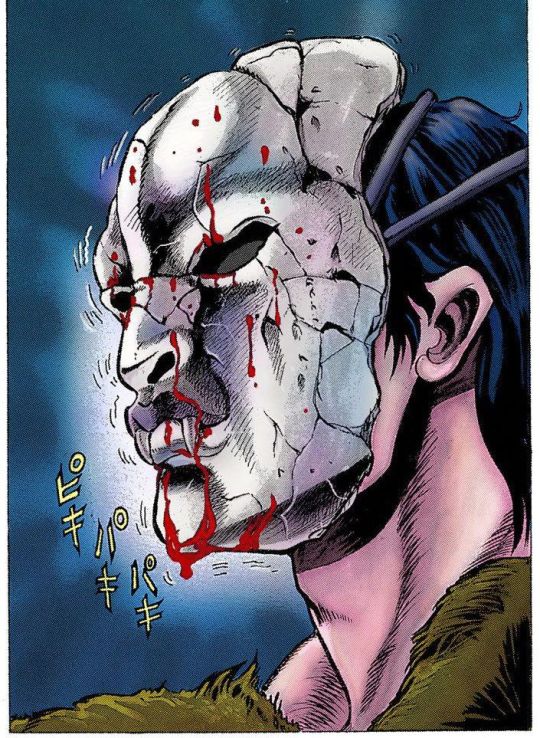
🇬🇧🗡️⚰️🩸🧛🐸🧂Yikes! P-part 1!🌭🍫🏰🧟🛳️🎩🥖
Back in May I liveblogged JoJolion, because I've been wanting to do it for a few years and couldn't find the time. Once I finally got into it, I had a blast, and that got me motivated to block out time to do other JoJo parts. I tried to cover the anime as I watched it in 2017, and the manga for the parts that weren't animated at the time. But I didn't really get a handle on how to do it right until later, and I always wanted to go back and read the manga for the parts I only saw in cartoon form.
And since Part 1 is the shortest one, I thought this would be the easiest one to squeeze into my busy schedule of reading comic books uh... important business. Yes, important sexy business. But liveblogging JoJo is pretty important and somewhat sexy in its own right, so let's begin, shall we?
The story opens on an ancient Aztec sacrificial ritual from sometime between the 16 and 12th centuries BCE. I don't want to spend a lot of time on that, since the main purpose of the scene is to showcase the weird, spooky mystery of the stone mask that appears throughout the story. For the first several chapters, it seems to be little more than a curiosity, but it quickly turns into something much more important.
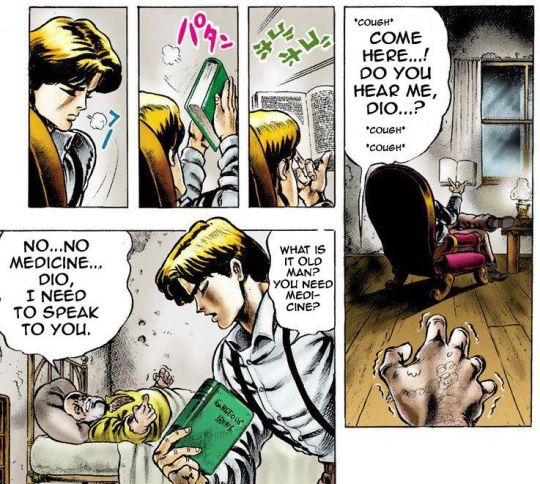
We then jump to 1880, where Dario Brando is trying to talk to his son, Dio. Look at this. Just look at this. This is the very first time Dio has appeared in anything, anywhere, and he's flipping us all off. No one holds a book like that, Dio, you salty, salty bitch. You ain't slick.
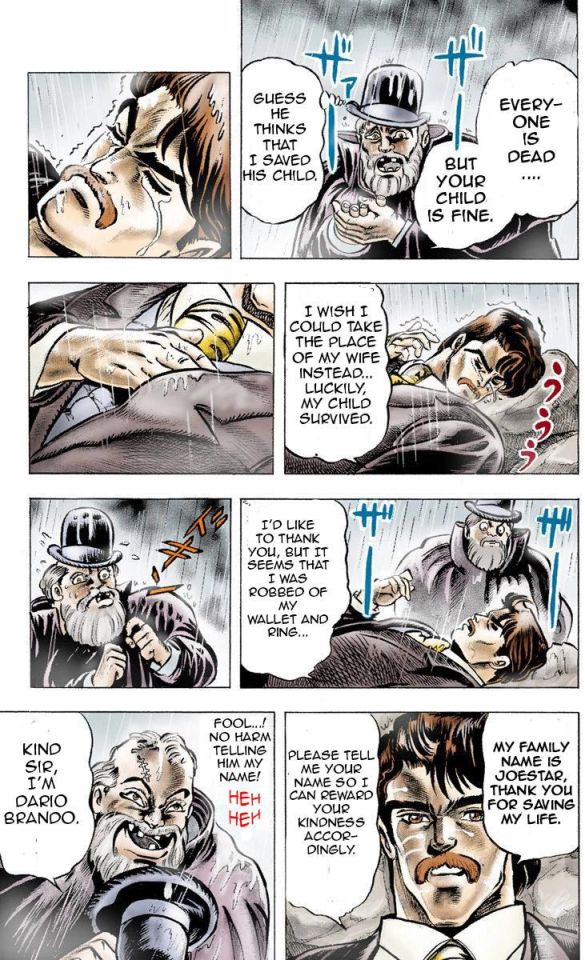
What Dario wants to tell Dio is that he once "rescued" George Joestar back in 1868. I'm using quote marks here because what actually happened was that Dario and his wife discovered the Joestar family in a carriage wreck and tried to rob their corpses. But George was still alive, and he mistook Dario's actions as a kindness. This naivete pretty much defines George Joestar's whole character arc.
George's driver was killed in the wreck, and so was his wife, but their infant son, Jonathan survived. The anime implies that Jonathan's mom used her own body to protect Jonathan as best she could, but that isn't spelled out here. I guess that's kind of a given, though. I mean, she died and the baby lived, so what other interpretation could there be?
Anyway, George wanted to reward the Brando family, so he gave Dario a bunch of money, which he later used to start a hotel, but kind of blew it. But also, George promised to take care of Dario's son if anything ever happened to Dario. So now that he's dying, Dario tells Dio to go to the Joestar estate, where he can become a rich man.
Dio agrees to do this, but not out of any love or respect for his father. He hated Dario, mostly for being a failure who mistreated his mother, and he vows to become rich and powerful, but not for his father.
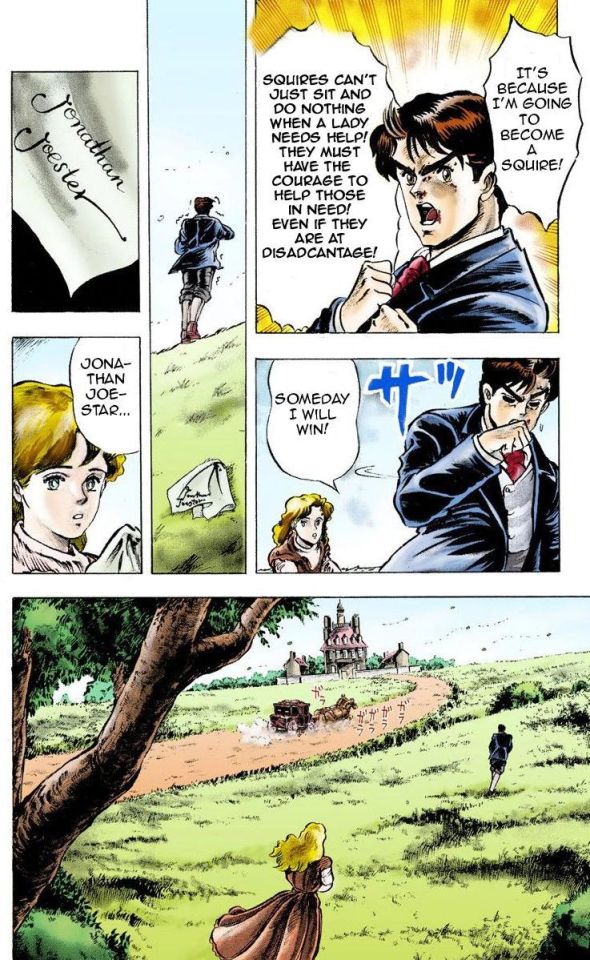
On the day Dio arrives at the estate, young Jonathan tries to rescue a doll for a girl named Erina. He doesn't know her, but he just happened to see bullies messing with her and chose to intervene. Jonathan gets his ass kicked, though. That doesnt' matter to him, though, because he considers himself a gentleman, and a true gentleman always has the courage to help those in need, even if he can't win. Especially if he can't win.
And this page might be the throughline of the entire JoJo series. I was watching some Hamon Beat videos a few weeks ago, and I was impressed with his response to the notion that Part 1 is "boring". Part 1 is literally the foundation of the entire series, and establishes all of the themes that run through the Parts that follow it. Sure, the 19th Century setting might be a little off-putting for some, and it takes a little while for the nutty super powers to kick in, but Hamon Beat makes a pretty strong argument. How much can someone really enjoy Stardust Crusaders or Diamond is Unbreakable if they hate Part 1?
Young Jonathan standing up for Erina--even when he doesn't know who she is, even when he's outnumbered-- is exactly the same thing that makes Jotaro advance towards Dio when he doesn't seem to have a chance of winning. It's the same thing that drove Josuke in his battle against Kira. Having preferences is fine. It's one thing to like Part 5 better because you liked the Stand powers or fashion choices more. But it's weird that people got into JoJo and seemed to completely miss the real heart of the story, so much so that they held the origin of it all with such contempt.
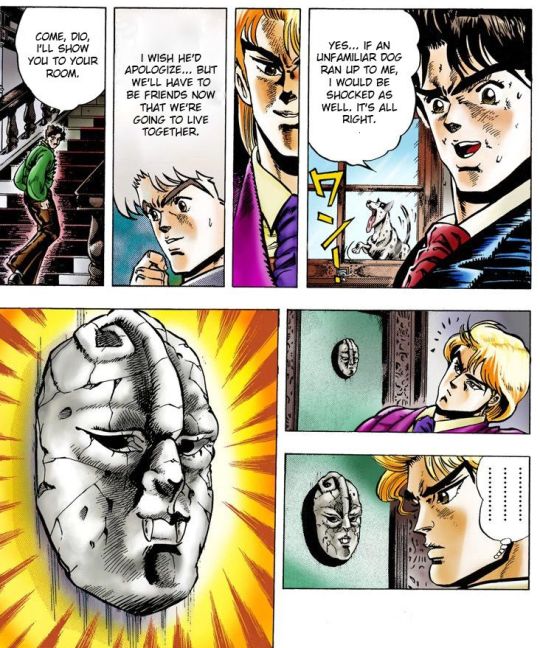
So Dio arrives to be adopted by George Joestar, and when Jonathan introduces himself, his dog Danny runs up and Dio knees him in the jaw. Keep in mind that Dio's whole agenda here is to play it cool and get in good with the family so he can score a huge inheritance. All he really has to do is behave for a few years until he's established himself, but he hates dogs, and he's too angry to hide it.
The family dynamic becomes pretty clear up front. Dio's main goal is to demoralize Jonathan any way he can. Presumably he wants to diminish Jonathan in the eyes of George, so that Dio will get the lion's share of the inheritance. And Jonathan is a little too nice for his own good, so he lets things slide in an attempt to get along. And George is still to naive to see Dio as anything but a perfect little gentleman.
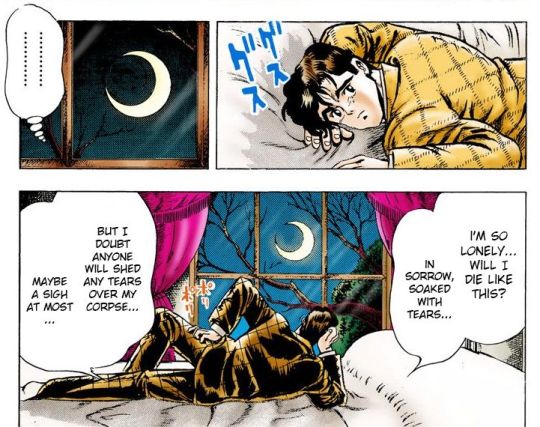
For example, one night George scolds Jonathan for his table manners and sends him to bed before he can finish dinner. George points out Dio's impeccable table manners, which is... kind of ironic, considering what Dio will be doing for nutrition later on.
Anyway, the isolation really starts to get to Jonathan, and he wonders in a moment of teen angst if anyone will even miss him when he dies. This always gets to me, because Jonathan is part of this lineage of JoJo protagonists, but he's the very first one, and the second one won't show up for decades. Jonathan's the founder of this thing, but he has no way of knowing that, and it's a very lonely position to be in. If only he could know how dearly he'll be missed after he's gone, and how much his loss will mean to his descendants in the future. Maybe this is why I like Part 2 the best.
Oh, also this scene of him staring at the moon kind of reminds me of Jolyne looking at the moon in prison. But let's move on.
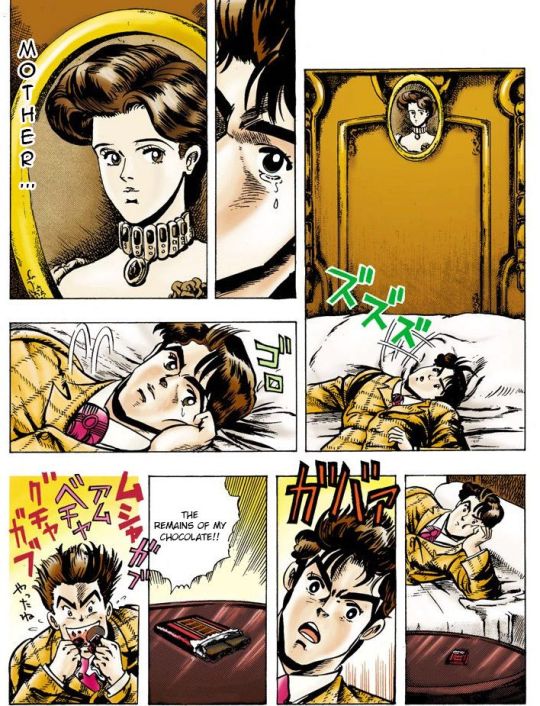
No, wait, let's not move on, because Jonathan's morbid thoughts lead him to notice the portrait of his dead mother that's mounted over his bed. Maybe that gives him some small comfort, the reassurance that if he misses her despite having no memory of her, then perhaps his life can mean something to others as well. Anyway, he forgot he had secret bedtime candy in his room, so he won't go to sleep hungry tonight.
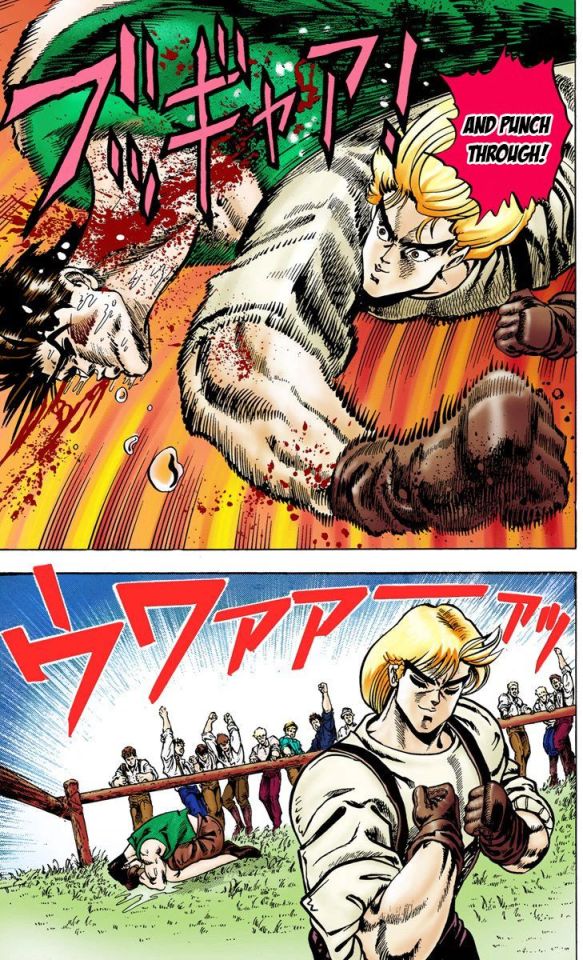
But Jonathan's life still sucks. Dio quickly steals away all of Jonathan's friends by beating him at boxing with his superior fighting skills. Jonathan and his pals box for fun, but Dio grew up on the streets, so he knows all the tricks. He offers to teach the others, but warns them not to share his secrets with Jonathan, whom he says can't keep secrets.
This is sort of the basis of Dio's interpersonal skills. "Everyone wants to be friends with someone who is strong or will do something for them!" By making himself useful to the others, and making Jonathan appear weak and useless, Dio can ingratiate himself to the other boys, and isolate Jonathan further.
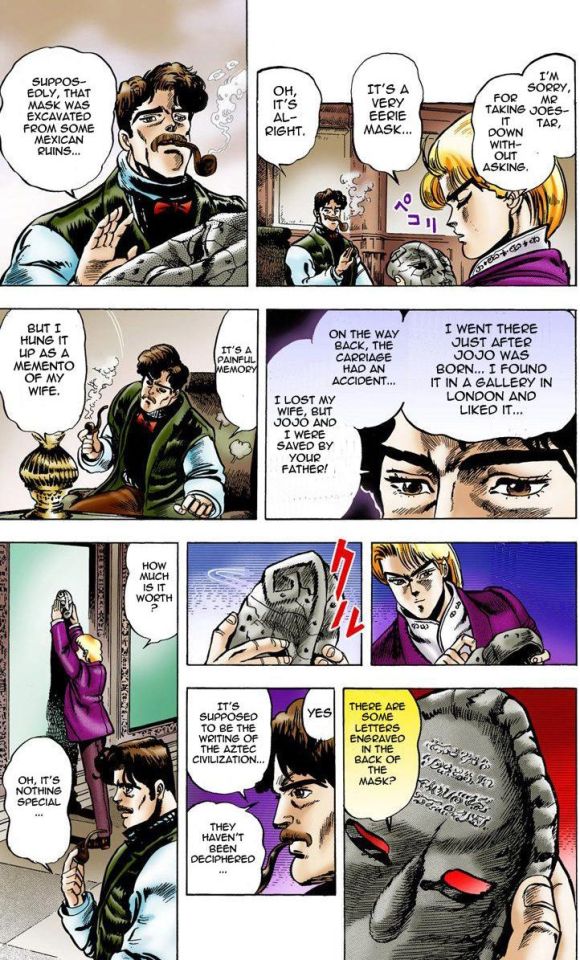
Later, George sees Dio checking out the Stone Mask and explains how he bought it at a yard sale in London the day of the carriage accident. Dio is curious about its value, its history, and the Aztec writings inside it, but he denies having any interest in the thing.
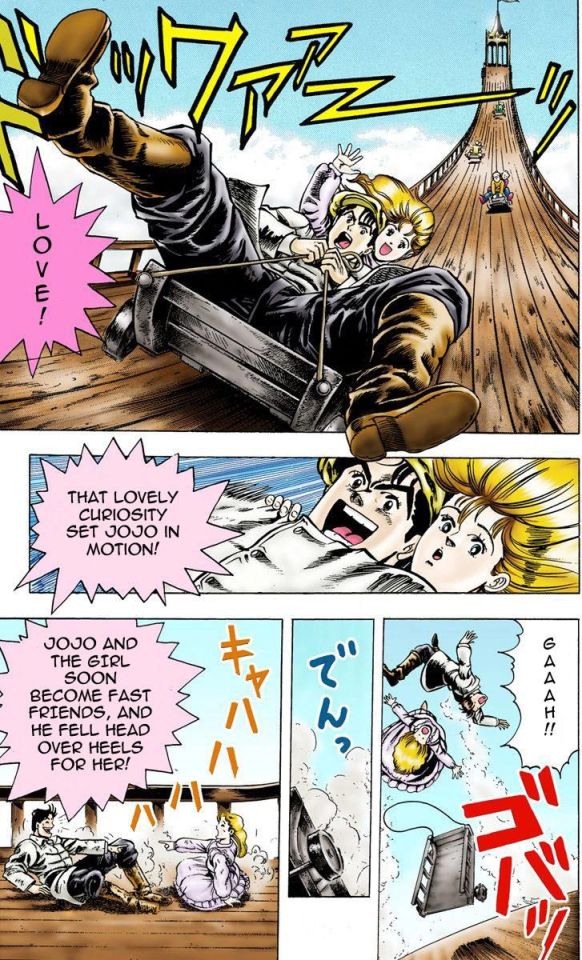
Meanwhile, Jonathan hits it off with Erina Pendelton, the girl he tried to help earlier in the story. They ride old-timey roller coasters and swim in old-timey swimsuits and so on.
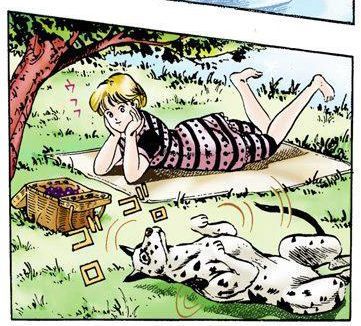
Here's a panel of Erina chilling out with Danny that I thought was pretty cool.
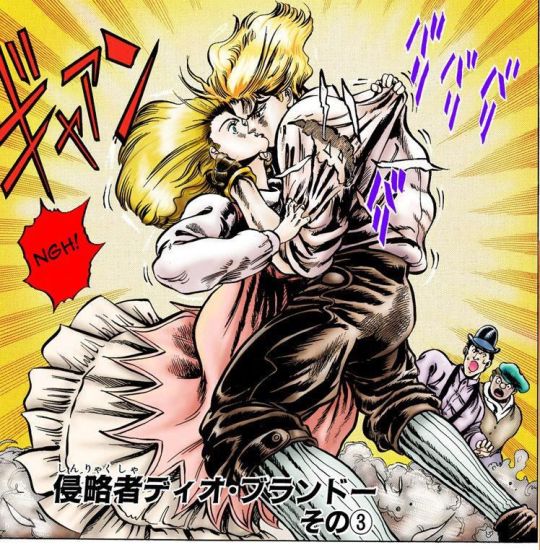
But Dio quickly finds out about this, and decides to forcibly kiss Erina just to wreck what little happiness Jonathan has left.
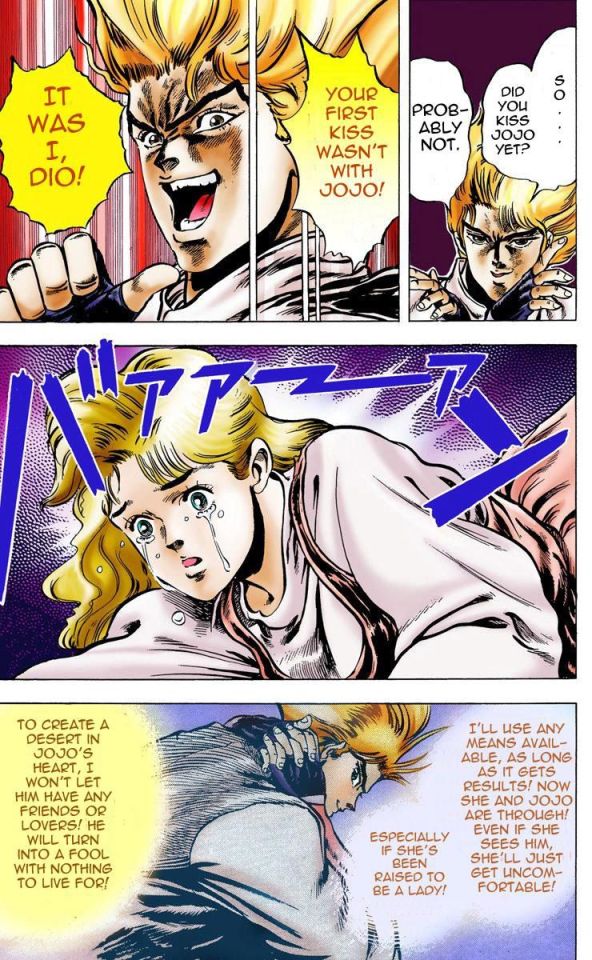
You might have noticed by now that Dio is kind of an asshole. Again, this is the blueprint for every other villain in the franchise. Dio's already got a bright future ahead of him as an adopted son of George Joestar, but he wants more, and he believes he can increase his own fortune by oppressing others. Dio wants to dominate Jonathan, Kars wanted to dominate all of nature, Kira and Diavolo wanted to erase all evidence of their crimes to live as they pleased, and so on.
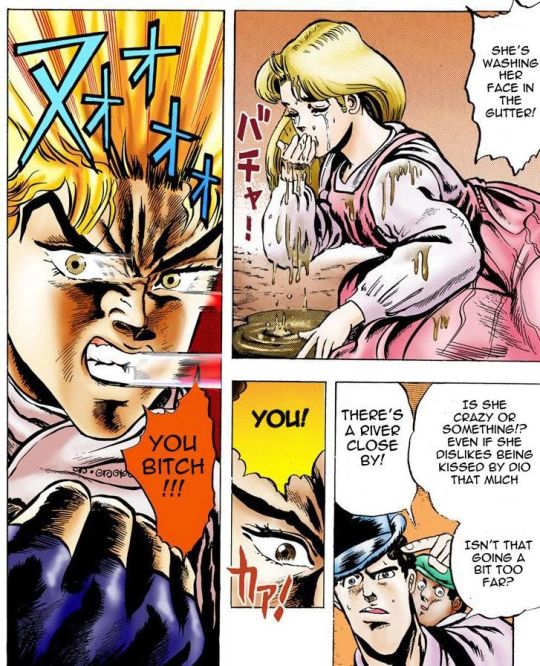
But it's not as easy as he likes to think. For all his cruel tactics and ruthless plotting, Erina can shut him down just by washing off her face with gutter water to show her contempt for him. Dio could just let this slide and appreciate how well his plan is working, but he can't. He knows he's being insulted, and he can't stand that. Deep down inside, he wants something that can't be reduced to a simple display of power. He can hurt and manipulate others but he can't make them love him.
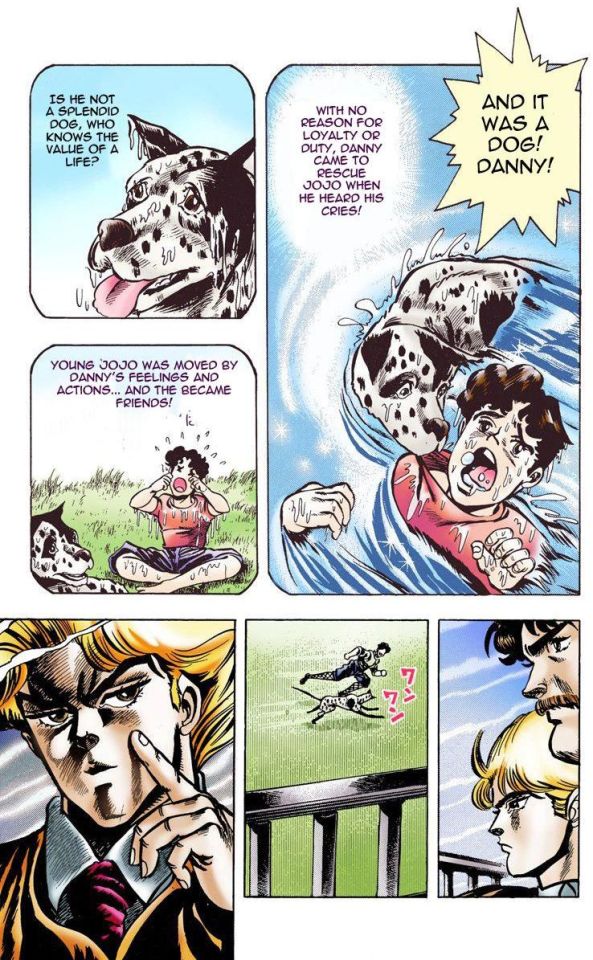
For a while, Jonathan isn't aware of this incident between Dio and Erina, because Erina is too ashamed to go near him or tell him. But Jonathan still has Danny. George tells Dio about Danny's backstory. As a pup, Danny was timid, so Jonathan use to tease him and throw rocks at him and stuff. But then Jonathan was drowning in a river, and no one was there to help him, except Danny, who dove in and pulled him to safety like a good boy.
The moral of Danny is that he had no reason to repay Jonathan's cruelty with loyalty, but he did it anyway, and after that they became good friends, with Jonathan never giving him orders. The bond between them was more like that of trusted friends.
Of course, Dio can't understand any of this. He just sees Danny as another vulnerability of Jonathan's to exploit. It's possible, though, that Dio envies what Jonathan and Danny have together, and he can't have that for himself because the concept is so alien to him...

Later, Jonathan finally finds out about what Dio did to Erina, and he confronts Dio immediately. Dio kicks his ass again, but this time Jonathan refuses to back down. He knows if he loses this fight, he'll never escape Dio's shadow, so he knuckles up and...

BAM! PART 1 IS BORING? BITCH WHERE?

YEAH FUCK HIM UP JONATHAN! FUCK HIM UP!
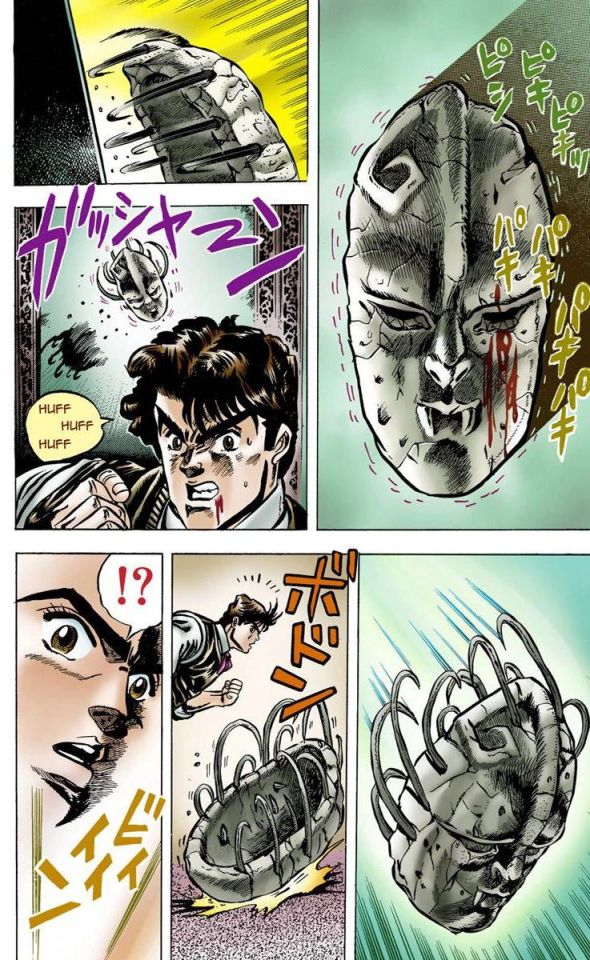
So as they fight, some of Dio's blood splashes onto the Stone Mask, and it falls off the wall, then a bunch of claws come out of it, as though triggered by the blood. This distracts Jonathan, but not for very long.
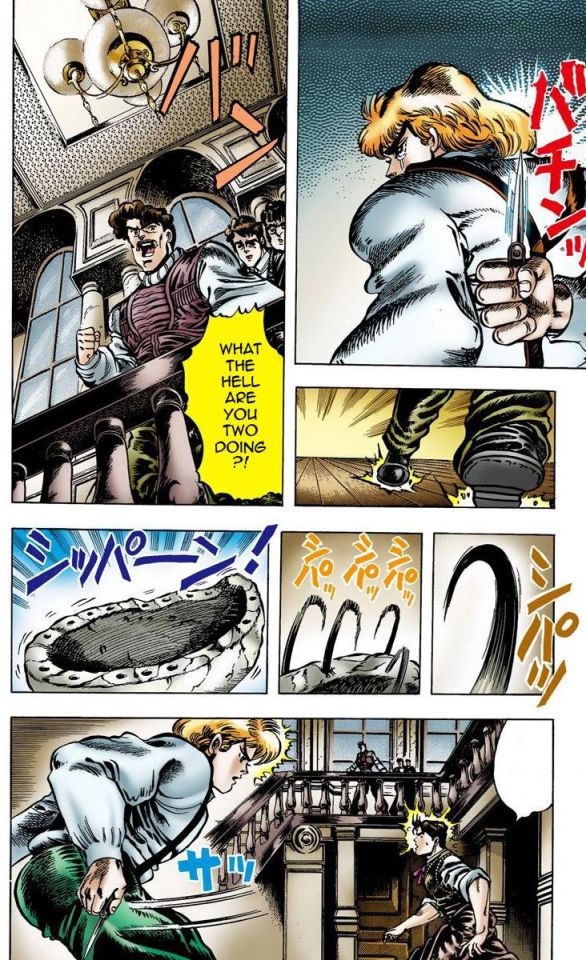
Dio actually cries, although I suspect this was just a diversion so he could pull a knife, but before he can escalate things, George shows up and scolds them both for fighting in the house. Being George, though, he leans harder on Jonathan for beating Dio excessively. Dammit, George...
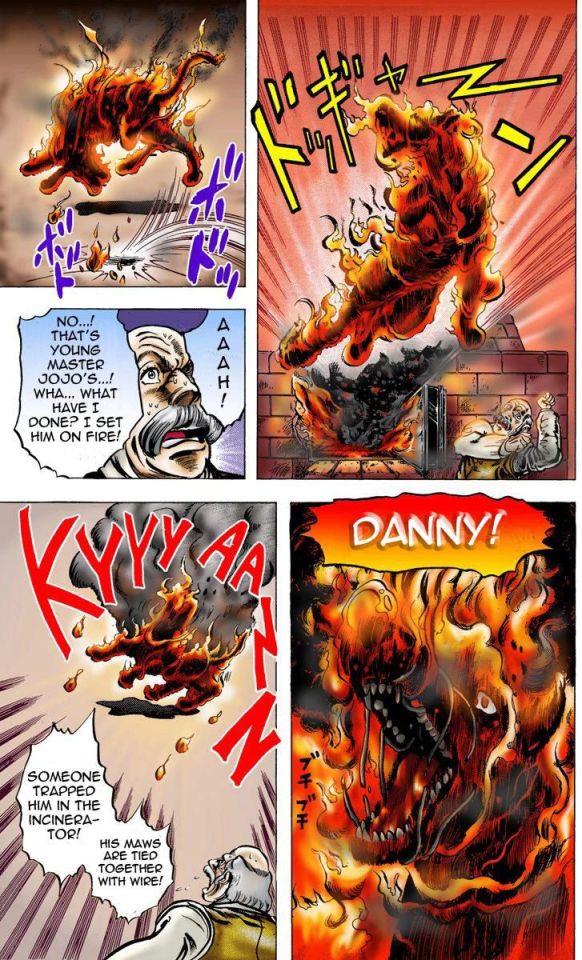
Dio retaliates by locking Danny into the incinerator, and the next time one of the servants uses it, he discovers Danny burning alive. I'm pretty sure the anime didn't show Danny getting out of the incinerator, so here you go.
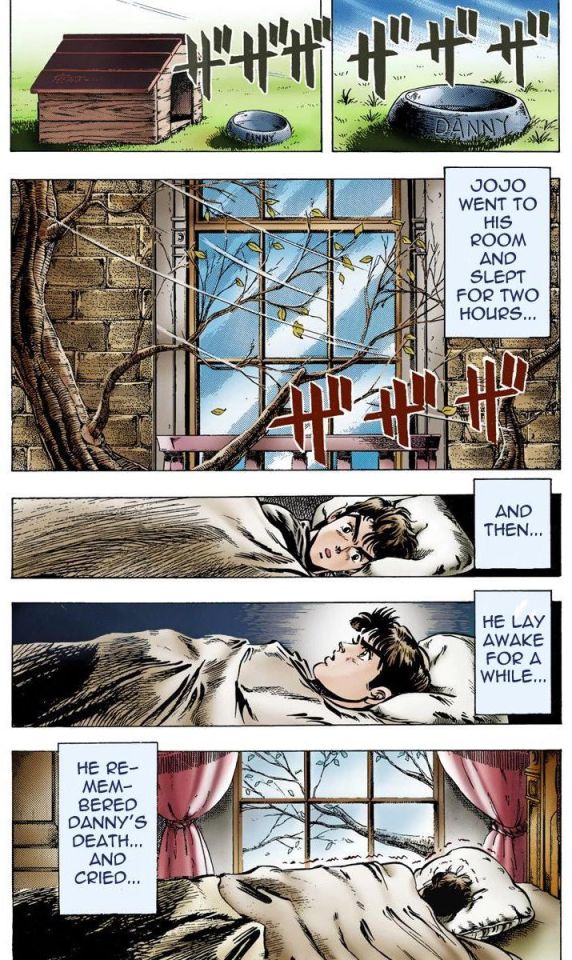
Jonathan comes home to find out Danny's dead, and he knows Dio did it but he can't prove it or start another fight, so he just goes to bed and has a depression nap. As for Dio...
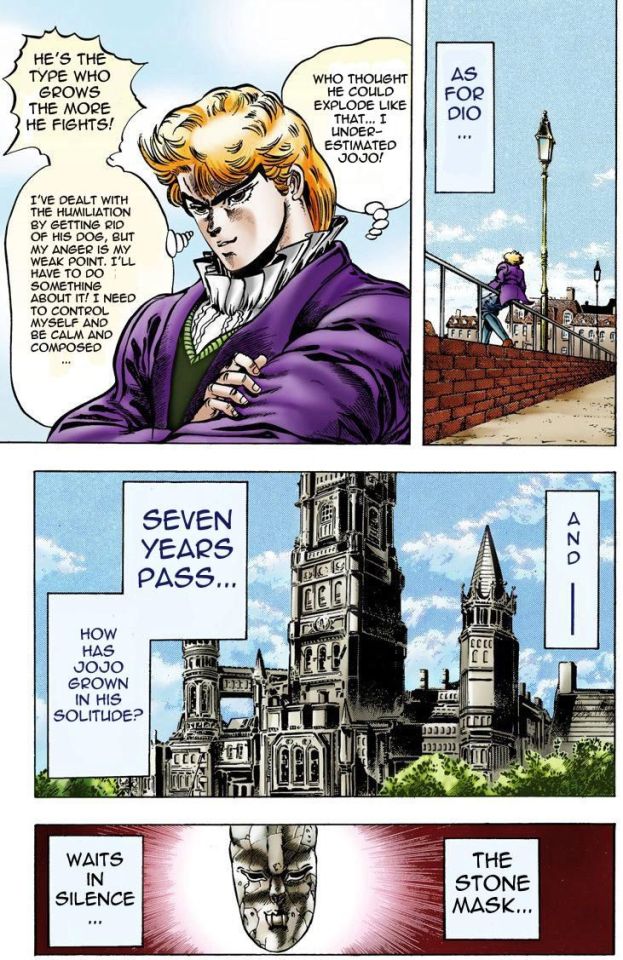
He finally does enough self-reflection to realize that he's overplaying his hand. Dio's plan is to play the long game and win the Joestar estate, but he underestimated Jonathan's righteous fury and pushed him too far. If he tries any more shenanigans, it might wreck everything, so he resolves to dial it back for a while.
Meanwhile the Stone Mask... uh... doesn't do anything. Patience, folks...
#jojo's bizarre adventure#phantom blood#jonathan joestar#dio brando#erina pendleton#george joestar#danny
11 notes
·
View notes
Text
Crazy how I went through a phase where I was hesitant to use the word hope while talking about Makoto because of how often the fandom's view of him reduces and bastardizes him into some happy-go-lucky hopeman who feels no negative emotion and now I'm back in my hope arc where I'm comfortable using the word again because I've figured out how to put Makoto's brand of hope into proper words that don't erase entire parts of his character. See, it's because hope and despair aren't a dichotomy. To act as if people or the world is only hope or only despair, just white or just black, is completely wrong. Just like it is to assume that someone is naive just because they're optimistic (spoiler: optimism isn't naivete) or childish because they're kind. Everything's got some good, some bad, and some in-between in it. Makoto's not some pillar of hope or avatar of everything that is good and pure and beautiful in the world, he is and always will be at his core just some guy even if he's capable of utterly staggering feats of heroism. Makoto feels plenty of negative things. A lot of them, in fact. Sadness, anger, jealousy, regret, even despair. It's just that at the end of the day (sometimes with the help of his friends and loved ones, too) he's able to accept, process, and bring that negativity forward with him because it's just a part of being alive. Getting knocked down, not knowing how to progress or if you even want to, being disappointed in what happens-- that's all part of being a human being, and Makoto has the maturity and strength of character to accept that and keep going even if the future is uncertain and things might not work out. He's a guy who cares a lot, who won't give up, and just keeps trying. A hopelessly stubborn guy who can't give up on his hope for the future, no matter how many times he stumbles and falls. And God, he cares. I think that means a lot.
#ooc ramblings.#ordinary courage — makoto#and by god does he try even when things seem completely hopeless. hopebros we stay winning#honestly i thank x.enoblade 3 and l.b6 for helping me get back into a place where i'm comfortable with the word hope again#such amazing stories
5 notes
·
View notes
Text
S1E1: "The Boy In The Iceberg"
You might be wondering why I want to write about a show I don't like.
Back in 2007 - when I was sixteen years old - there was a lot of buzz about a show called Avatar: The Last Airbender. Many held it up to be the greatest animated series ever made, a stunning example of the sophisticated stories animation could tell and a rebuke to the idea that children's entertainment was necessarily childish. I put on the first episode, then turned it off in about ten or fifteen minutes because I found it boring and childish.
Over the next decade and a half, the show remained a spectre over my media discussion. A lot of people I liked and respected (as well as quite a few I didn't) still spoke of it as a favourite, dissecting its themes and qualities; in particular, Zuko's character arc, considered by many to be the greatest redemption arc ever written.
At the same time, my writing in media grew more sophisticated; I have written at length about my favourite works and studied storytelling across a variety of mediums and genres. I've written in-depth, episode-by-episode analyses of some of my favourite shows and found the experience very rewarding; learning not just about how they worked, the storytelling techniques they used and the philosophies they conveyed, but my own values and aesthetic tastes.
A couple of years ago, I decided to give Avatar another shot and find out not only what people saw in it, but unique insights I could pull out of it. To my great shock, I fucking hated it. In fact, not only did I find it mostly tedious, I found parts of it morally vile. Most of the show has the same naivete as almost every other piece of children's media ever made, but parts of it struck me as terrible lessons to teach children about trying to do good in this world.
So why write about it now, here, in this format? Generally I don't go in for making snark or roasts or whatever you want to call it. I was a big fan of reading it early in my media literacy studies - I treasure a Harry Potter And The Deathly Hallows snark blog I read over a decade ago that has sadly been wiped from the internet - but for the most part I've found it more rewarding to discuss things I like, if only because I would like to imitate what they do.
But I also believe in exposing myself to new ideas, even ones I might find offensive; some of my favourite works have been ones I initially thought looked abhorrent but gave a shot based on recommendations. I have also learned from things I disliked and found things to imitate. Aside from both its spectacular aesthetic and its belief in faithfully depicting POC cultures in a genre that was overwhelmingly white and Western, Avatar: The Last Airbender is so drastically different from my own storytelling and moral values that I figure it's worth a deep dive to see how it ticks.
As for why I share this publicly? I genuinely don't want to hurt anybody's feelings over a children's cartoon. If me criticising A:TLA upsets you, block me - I won't be offended. But I'm obviously going to get pushback, which is exactly what I want; I want to know how my ideas sound outside my head, particularly to someone who doesn't share my values. I want to interrogate this show, and I want to interrogate responses to my criticisms.
Anyway, this episode.
I think this does work pretty effectively at introducing us to the premise - Katara wakes Aang up, he's been in the ice for a hundred years, Zuko is after him, Aang wants to Katara to be trained in waterbending (I also think the iconic opening sequence is admittedly pretty cool and sets up the overall world well). It's a bit slow for my tastes, but I read James Ellroy novels, so I usually have to find myself tolerating slowness.
But we're already presented with a few recurring annoyances that will carry us across the series. The first: Sokka isn't funny. He's annoying, he's very very annoying. This almost works for me in his very first scene, because it serves a very particular purpose: conveying that Katara is a talented but inexpert waterbender whose talents aren't properly recognised or understood.
It's the way it's presented with a complete lack of nuance that bothers me. I don't mean moral nuance - I'm okay with completely disagreeing with Sokka in this moment - I mean a lack of comedic nuance. Sokka's sexism is presented so broadly and so generically that it's hard for me to find it funny.
I invite you to compare jokes about his sexism to similarly themed jokes in Futurama (finishing its iconic first run roughly two years before A:TLA began), in which the predictability of the jokes was compensated for by both the originality of their imagery and the speed of the jokes - setup, punchline, boom, move onto the next joke. That particular sequence ends up saying a lot about how men can be more caught up in flash than substance - social commentary rooted in the characters.
You can also compare it to the jokes about sexism in It's Always Sunny In Philadelphia (which would begin its first season shortly before A:TLA), where I would argue they're equally as broad but contextualised by absurdist farce plots; the characters immediately escalate things with one another and push a scene from basic sexism to somewhere particularly absurd.
Neither of these things are present in the humour of A:TLA, and you get a lot of comedy scenes - even within this one episode - that are shallow enough to be predictable and slow enough for that to be excruciating. Jack De Sana's voice acting makes it even worse for me - he's so hammy that he comes off less like an idiot and more like a guy who desperately wants you to think he's an idiot.
For a positive example of what he's going for where that approach works, think of Rik Mayall on The Young Ones; not only does his flailing, desperate approach fit the desperate, needy character, he's supported by writing rooted in a very specific time and place, where Rick's neediness comes partially from him growing up in middle-class Britain and projecting anarchist causes onto childish concerns. Sokka's humour, despite the beautiful specifics of Inuit culture in the animation, is much more generic. The fact that he's dumb says nothing.
There are a few things I like in "The Boy In The Ice". This kicks off the fact that Zuko is miles more interesting than everyone else; I actually like Katara and Aang in theory, because both of them have the broad goals of being good people and very different, specific ways of trying to achieve that. But Zuko marries a broad goal - being the strongest guy in the room - married with a very clear, specific goal of Catching The Avatar.
Good storytelling is the easiest thing in the world: somebody wants something, they act to get it, consequences come down upon them for their actions. We actually get a very simple, elegant example of that at the end of the episode - Aang wants to find out what happened to the world, he goes into a forbidden Fire Nation wrecked ship to find out, he succeeds at his goal but sets off a flare that alerts Zuko.
Zuko very quickly establishes himself as brash and loud; the ironic thing about this show's pretentions towards pacifism is that it best expressed its characters through violence. Here we see Zuko with a simple goal - defeat the enemies in training - and putting all the power he has into every shot he takes; from a storytelling perspective, it's a bit redundant; actually, if I were editing this, I'd cut things down so it was the first we see of him, and he sees Aang escape the ice while that happens.
For a show with very blunt characterisation and plot turns, it can often have very inefficient overall storytelling structure. An example where this works a little better is Aang's penguin sledding; it's not strictly necessary to the plot, but it does tell us that a) Katara isn't completely humourless, b) Aang's joy is sincere and thoughtless, and c) Aang, in fact, brings out a sense of joy in her. The penguin sledding is the most joyful part of the episode and lays the groundwork for later characterisation.
On the other hand, we have a fundamental storytelling flaw that will plague Avatar: The Last Airbender all the way to the bitter end: there is only one correct direction for the plot to go, one character knows this and we are simply waiting for things to inevitably go their way. In this case, we have Katara being the only one to believe Aang can teach her waterbending and her grandmother telling her not to get her hopes up.
Now it doesn't seem like much in the grand scheme of things, but it's the start of a recurring pattern of everyone else being Dumb and Wrong, sometimes because the deck is very obviously stacked in their favour - like here, where Aang has very obviously been subjected to some kind of supernatural influence, as well as the fact that he's very obviously the Avatar to any viewer even slightly paying attention at this point - or based on sheer intuition.
On one level, it bothers me because it says that bad things happen because everyone is dumber than you are, which is a terrible and arrogant attitude that makes the world worse and destroys empathy. More importantly, it saps all the tension and excitement for the story; we are effectively told what's about to happen before it happens. Where's the fun in that?
In fact, you can kind of tie these two things - obvious humour and predictable plotting - into one problem: it exists to tell the audience how smart they already are, and worse, the audience doesn't actually have to be that smart to get it. I don't watch television to be told how smart I already am. I don't need TV to flatter or condescend to me.
SCATTERED NOTES
In terms of humour, we've also got the start of one of the weirder elements in a show about trying to do good: Sokka being humiliated, constantly, for no reason. Again, you can compare it to Futurama, which has Zoidberg serve a similar purpose, and in fact suffers above and beyond what he really deserves. Futurama, of course, is a dirtbag show about dirtbags (and I love it for that), so there's no weird hypocrisy there. Here it's apparently heroic to continuously bully a guy to the point that the universe itself does it.
The animation is undeniably gorgeous. The blend of different cultures into a specific and fictional cultural context is the most effective element of the show. Ships marooned on land are inherently cool, and I always loved Aang's tattoos. There's a specificity here that's lacking in the actual story.
I'll be putting these up every Saturday.
1 note
·
View note
Video
youtube
Ratchet & Clank Part 7: In space no one can hear you scream bloody murder
(The first half of the video has no audio because my pc was being obnoxious, playing the audio from my perspective but not letting the program record it and I realized it too late. Sorry for that)
Oh boy here we reach Gemlik Base!
It’s long, it’s tough, it’s pretty damn unforgiving
Don’t take this as a negative though, I actually quite like this place, especially due to its atmosphere, what with it taking place mostly in space and that music
My only issue with it is that near the end it forces you to fight a huge room full of enemies. If you remember I said that this game’s weapons and controls are just not all that suited for direct engagement and this is one moment where I feel the game forgot about this. It feels like something straight out of Going Commando and beyond but without the key mechanics to make it not awkward to manage, especially with the camera not really focusing on the enemies
This is also where Ratchet completes his “character arc”....if you can call it that
Ok so it’s pretty obvious that the game wants to present Ratchet’s story as that of someone who initially only really cares about his own selfish interests, only to eventually be swayed into becoming a full blown hero thanks to Clank, who acts as a sort of moral compass to him. On paper this is good
In practice it’s very halfassed for a number of reasons
The first one being that, like Ratchet said in a previous video, we don’t know him. The game tells us absolutely nothing about him as a person or what he usually does on Planet Veldin, the most we know is that he’s a mechanic and he presumably wanted to explore the galaxy in search of cool stuff to see which is why he was trying to build a spaceship at the beginning. This helps to explain his initial behavior throughout the first act, where he’s essentially a pretty easy going dude who’s mostly just following Clank along for the ride, but is easily distracted by stuff like wanting to participate in hoverboard races or being made into an official hero by Captain Qwark
Then Clank almost has them both killed when he walks into Qwark’s trap and from then until now Ratchet pretty much switches to a completely different character. He’s super spiteful towards Clank, keeps saying the meanest shit to him and suddenly becomes obsessed with getting revenge against Captain Qwark to the point that he flat out states multiple times that he doesn’t care if Drek keeps destroying planets so long as he gets to Qwark. Not only is this a complete 180 from what he was at the beginning it’s also pretty damn unwarrented
I can get being initially pissy at Clank for his naivete, but Ratchet literally holds this grudge until the last act of the game, even though the game makes it pretty clear that Clank is just naive, mostly due to the fact that he was only recently built and doesn’t have much experience with the world. This doesn’t feel like Ratchet having a volatile attitude, this makes it look like he’s a childish prick who flies off the handle for the flimsiest of reasons
And while him being mad at Qwark for double crossing him makes sense the dude gets obsessed to such a forced degree! I almost expect him to bust out a giant sword while screaming his name to the clouds, you’d think he’d killed his parents with how mad Rathet is at him, while Qwark is just some guy who happens to be a famous superhero who turned out to be a conman.
And after all of this now Ratchet suddenly flips the switch again. After he sees Drek’s newest plan for destroying a planet he suddenly starts having second thoughts about this and after finally dealing with Qwark he goes “yeah I’ve been a jackass, let’s go save the galaxy!”, which makes no sense because EVERY planet in this game has been attacked by Drek in some way, yet Ratchet never cared, not even at the start before he got all pissy, yet only now does he switch into responsible hero mode, without it even being some kind of gradual slow change brought about by Clank’s positive influence, hell Clank at some points even says “This is not you Ratchet!” when he acts like a dick and even goes “This is the Ratchet I know!”, which is stupid because they’ve known each other for very little time by this point and even at the start of the game Ratchet wasn’t that heroic to begin with!
I know that many fans hate how Ratchet has had his attitude mostly stripped away from him in later games from what little I know, making him blander. That’s not good, but this goes too far into the opposite extreme and feels far too much like flat out sloppy story telling to me. I’m also sure that’s how the devs must’ve felt back then because, from what I know, Ratchet’s personality was one of the game’s most criticized aspects back when it released, so much so that for the sequel they largely rewrote his personality to be way friendlier and even gave him a new voice actor in order to further drive home the idea that this was a “new” Ratchet.
1 note
·
View note
Text

Murder in Manhattan by Verity Bright(A Lady Eleanor Swift Mystery #14)
Glitzy parties, sightseeing at the Statue of Liberty and strolls through Central Park with Gladstone the bulldog… Lady Eleanor Swift is loving her first trip to the city that never sleeps, until she witnesses a murder!
After crossing from England on the SS Celestiana, Lady Eleanor Swift sets up her home-away-from-home in a lavish apartment in New York City. She is soon the toast of the town, with no high-class soirée complete without her presence. Of course, she drags her butler Clifford and Gladstone the bulldog along to every party too.
But when she witnesses the charming doorman of her building, Marty, knocked down and killed in a hit-and-run, she finds fashionable society suddenly closes rank. The only local detective interested in helping her find the culprit is street-smart beat cop, Officer Balowski.
Resolved to get justice for Marty and his family, Eleanor searches Marty’s tiny apartment and is shocked to find five rolls of banknotes tucked under the floorboards. Money talks, but Marty was struggling to make ends meet, so where did the cash come from?
The next day, wealthy entrepreneur and flashy philanderer Ogden P. Dellaney – a man Marty used to work for – is found dead downtown, miles away from his swanky Upper East Side mansion. Eleanor and Balowski are sure the deaths are connected, but not even Dellaney’s wife is willing to answer their questions.
Then Eleanor is served with an eviction notice and Balowski is fired from the NYPD. It becomes clear that something is rotten in the Big Apple and Eleanor is determined to get to the core of the mystery before the murderer strikes again…
My Review:
It’s not easy to say something original after one took part to 14 blog tours and review all the previous instalments. This is the best novel so far as there’s a continuous evolution in the character’s arc and this is one that sees our heroes facing a new environment and people who are an unknown quantity.
You can’t know who you can trust and there’s a lot going on under the façade of the Manhattan high society.
It’s the age of Charleston but also of gangsters, Prohibition, and corruption.
Eleanor and Clifford, with some help from local people, face this new world and a couple of murder.
I love how the authors always add interesting social remarks to their stories as the social naivete of Eleanor can help her to see beyond the conventions.
The mystery is twisty, action packed and fast paced. I couldn’t stop reading and turning pages in a sort of one-more-chapter-syndrome. I had fun and was kept guessing even if some gut feeling suggested me who the villain was.
Not the best to read as a stand-alone but will surely be love by those who read the rest of the series.
Highly recommended.
Many thanks to Bookouture for this ARC, all opinions are mine
The Author:
Verity Bright is the pseudonym for a husband-and-wife writing partnership that has spanned a quarter of a century. Starting out writing high-end travel articles and books, they published everything from self-improvement to humour, before embarking on their first historical mystery. They are the authors of the fabulous Lady Eleanor Swift Mystery series, set in the 1920s.
https://twitter.com/BrightVerity
Sign up to be the first to hear about new releases from Verity Bright here: https://www.bookouture.com/verity-bright
Buy Link:
Amazon:https://geni.us/B0BXLMZ5JVsocial
You can sign up for all the best Bookouture deals you'll love at: http://ow.ly/Fkiz30lnzdo
1 note
·
View note
Text
Fenris absolutely REFUSING to get some context on his anti-mage views is just super annoying. I mean, unlike everyone else, he actually has something to justify it-a.k.a. Tevinter trauma-but he doesn't seem to take ANYTHING he sees outside of Tevinter into account. The apprentice Ella narrowly avoiding SA? The templars never seeming to actually HUNT the blood mages around Kirkwall even though that's their JOB? The way Meredith, despite otherwise being fanatically anti-mage, ignores mage! Hawke because he's rich, powerful and "useful" (which to me indicates a certain corruption and hypocrisy). The fact that Bethany, if she doesn't go the Deep Roads, gets taken away against her will? The fact that Meredith's solution in the final quest means her death? The fact that Hawke's mom had to run away to marry Malcolm, the fact that all Hawkes were fugitives because otherwise their family would be torn apart? None of this ever makes him pause. Instead, he just continues to hate mages because Tevinter, experiences in Kirkwall and outside of Tevinter be damned.
This is a massive problem with the DA2 companions in general I feel. While the Origins companions have more fleshed out characters AND character arcs, the Kirkwall gang feels more like archetypes who get more exaggerated over time. Some of them, like Sebastian, Varric, and admittedly Anders, do have the ability to change over time in new ways. Sebastian flip flops from devout to revenge-driven, and agonizes over retaking Starkhaven enough to make him complex. Varric's relationship with Bartrand takes a lot of twists and turns over the course of the game. But the rest, not so much. They don't really change or grow so much as their character archetype gets more exaggerated. Carver starts out as a resentful younger who is inexplicably pro-Templar. Instead of being able to understand the other side, Carver can either a) die, b) join the Grey Wardens while still resenting Hawke, or c) join the Templars for flimsy reasons. Bethany is better, but she doesn't really deviate from her 'sweet little angel' personality either. Or from her status as a victim of anti-mage oppression. Like Carver, she can a) die, b) join the Grey Wardens, or c) get put in the Circle against her will. When we meet Merrill, she's naive to the point of being extremely childlike (which is a marked contrast from her characterization in DA:O) and is obsessed with restoring the Eluvian at any cost. Throughout the game she just becomes MORE obsessed with the Eluvian. Instead of becoming less naive, her naivete instead becomes more noticeable. Isabela is a hedonistic, self-centered pirate captain in Act 1, and by the end of Act 2, she's only shown to be even MORE self-centered. Since, if you don't have enough Friendship or Rivalry with her, Isabela won't return the book, instead letting the Qunari try to take over Kirkwall. Even though she knows firsthand that forced conversion is AWFUL. Aveline mainly just goes from Lawful Neutral soldier to Lawful Neutral city guardsman, which is not a character change but a job change. She CAN get over her husband's death, but only if you put effort into it. And Fenris? Well, he's a traumatized ex-slave (which I sympathize with), and he stays a traumatized ex-slave, but if Hawke is a mage and treats him right, Fenris can make Hawke the exception to his views. This contrast between the broad archetypes of DA2 and Origins is part of why Origins's writing is infinitely better.

I love "fugitives together" ending so much. People call Anders romance depressing for very wrong reasons. Like oh, you think chantry explosion was sad? How about Hawke's whole friend group calling his best friend and lover mad for literally the same things Hawke stands for? How about mage Hawke's friends having no problems with templars, the same people, who would gladly imprison Hawke for life or even execute him for apostasy? I think people idealize Kirkwall gang way too much. Varric occasionally drinks with templars and has almost zero principles. Aveline helps templars to arrest apostates. And Fenris...I don't know how much patience a mage needs to listen to "all mages are bad magic itself is bad but you're different" for 6 years. The part where you can kill him in the Gallows for trying to murder you is kinda bruh too. And Isabela doesn't care what side you choose in the end. Isn't it depressing, to know that your friends don't care even one bit about people like you dying and being tortured literally every day? I don't like "fix it" headcanons where Anders warms up to certain companions because why would he? That's, like, the whole point of the game. Playing a mage IS isolating. It WILL make you look unlikable to others if you're vocal enough about the oppression. Because most people tend to ignore all the problems that do not concern them directly and they don't like when the said problems are being pushed into their faces. I can't speak for other players but for my mage Hawke, life in Kirkwall was awful. Like on the level where you think taking your own life is not that bad awful. Anders and Merrill were the only people who didn't make him feel even worse for being a mage. I don't think being fugitive is sad. What saddens me the most, is that only on the run with Anders Hawke realizes that he is finally happy. Because running from authorities is way better than running from your own nature. Its not sad when you and your lover are alone against the whole world. It`s only sad when the unjust world breaks your spirit and you accept it as it is without fighting.
63 notes
·
View notes
Note
I do wonder if Nobara do return— And that’s a big if since it’s been a hot while we last heard about her— What would be her role?
Or not necessarily role, since she does have a unique ability to damage the soul. But more like… character arc I suppose?
Like some people would theorize that Nobara could possibly help Maki from spiraling. However, I personally believe it makes much more narrative sense that it would be Yuta that does it.
I must think that Nobara would possibly go through her own arc. But my question is how?
Since I thought her arc is to be less judgmental with her black and white thinking and expand her world view. But the only person that I can think would challenge Nobara on this is Mai. Since Nobara judged Mai harshly despite the fact that she too was a victim like Maki.
But then like… Mai died so… now what?

Okay, so all the reasons Nobara might come back, and some of the reasons she might not.
Let’s start with why she might not. By the way I’m not arguing whether or not she’ll come back, because in my mind it’s a very strong “...Maaaaaaaaybe?” so it’s just easier to list arguments in support or against.
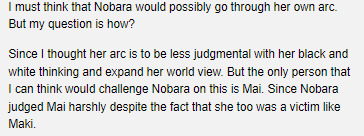
This is definitely the biggest reason why it would be hard to reintroduce Nobara back into the story. Part of this is Gege’s fumbling his handling of female characters, simply put Mai and Miwa are characters who are better written with way less screentime because they both have obvious character flaws, a character arc is built around a flaw the character has that they either have to work on or face the consequences.
In comparison to Noara, Megumi and Yuji have clear flaws. Megumi is at times borderline suicidal, he’s really emotoinally unhealthy, he picks and chooses between the people he saves and he lets die. He has a lot of connection to bigger plotlines in the Jujutsu World, the Zenin Clan, his legacy as Toji’s son.
Yuji also has a major flaw of being self sacrificing and has little self worth, he prioritizes other people far above himself, he has a character conflict around finding a way to die, being a little too willing to die, acting like he has little agency or that he’s individually worthless and much preferring to be a cog in society, he’s also continually dealing with Sukuna’s machinations from inside his own body.
They have clear flaws and they’re connected to the world around them, in comparison Nobara seems a little tacked onto the trio as an afterthought to the point where it is hard to even speculate on where she would fit in post shibuya. We get one flashback to her home village and it’s not even about her life as a jujutsu sorcerer in the country side, just a childhood friend she had. That childhood friend is apparently just fine in the city, so that character motivation and plotline is resolved for the most part. Everything we know about why Nobara became a sorcerer is shoved into a databook (her grandmother), Saori just seems to be a normal person so I don’t even think there was a mystery about her home town.
You could say her flaw is both her naivete and egotism, she ends up kind of repeating misogyny against Mai when Momo tries to explain what misogyny is like in the Jujutsu World because she views Mai as a bad victim. Solidarity is solidarity with all women and victims, not just the people you personally like. Nobara’s belief that she can simply overcome all adversity with her strong willpower could also be seen as a flaw.

This is a mistranslation it’s more like ...
⇒ “How to put it… The seats in my life? I don’t want people who’re not sitting there to affect my mind in that way or another.”
⇒ “(…) Well, I guess there are people like you who just come bringing their own chairs and sit [with me], too”
which is Nobara saying she only cares about a select group of people, which in a way reflects Megumi’s flaw of just picking and choosing who she saves.

Nobara’s flaw could be seen as her hypocrisy, she’s one of those loud, crazy people who can easily step on other people’s lives. If they’re not in her small circle of friends she doesn’t really care, she feels little remorse over killing Choso’s brothers. If she comes back that could potentially lead to a conflict with Choso, as unlike Yuji who Choso can forgive because they are brothers, not only is nobara also a murderer, but she doesn’t really feel sorry about it.
Her naivete and hypocrisy are things that could come to have consequences for her upon her return, for instance you mention Yuta seems more appropriate for the role of supporting Maki and saving her from her spiral than Nobara does. If you look at it from that angle, Nobara could try to help Maki and fail, number one because she does not actually understand all that much about what happened in the Zenin clan she was just making judgements as an outsider and number two because she never liked Mai and that’s the person that Maki is grieving. Mai in general just represents a part of Maki that Nobara doesn’t understand in her amdiration of her.
This is also the part where I start quoting other people, because I ferociously googled other people’s posts on how they think Nobara might come back due to this being a weak point for me. This post, brings up the fact that if you look at the losses Nobara has suffered so far, they could be the result of Nobara being arrogant and naive to the world and therefore her loss at Shibuya could be a low part in her arc that she has to recover from.
Jujutsu Kaisen is nothing if not rigidly efficient in how it tells this massive story. I believe every instance of Nobara actually leads us to see a low point in her character arc in Shibuya and a possible return in the Culling Games.
The major foreshadowing to her return is during the Kyoto exchange arc. Her fight against Momo clearly has her ignorant of the plight of women in the JJK universe in Chapters 40 and 41.
This seems to return with Mai dead, Maki scarred and Nobara seriously injured. There's some that claim her not being dead would lower stakes when it's obvious Mahito still would have irreversibly destroyed her youth and beauty that she was proud of all the way back in her introduction in Chapter 4 believing she should be a model.
If being beautiful and dressing up is part of what makes Nobara Kugisaki, Nobara Kugisaki then what is she with half of her face deformed or missing completely?
If Nobara’s main strength is the power of her ego and self confidence, then introducing her back with a severely bruised ego with all the losses she has endured then that could represent a new struggle her character has to deal with.
The second part of the post brings up that Nobara’s power is currently under-explored, as I said of Yuji and Megumi she seems to be the least connected to the Jujutsu World around her, but Gojo himself said that all of his students are supposed to have remaining potential. Nobara is referred to having come close to feeling the core to cursed energy, which is why she dealt a bigger blow to Mahito than Mahito expected having written her off as weak.
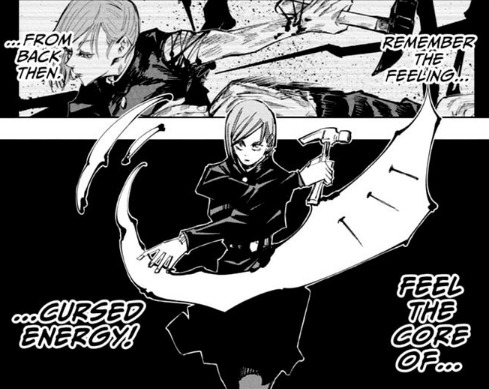
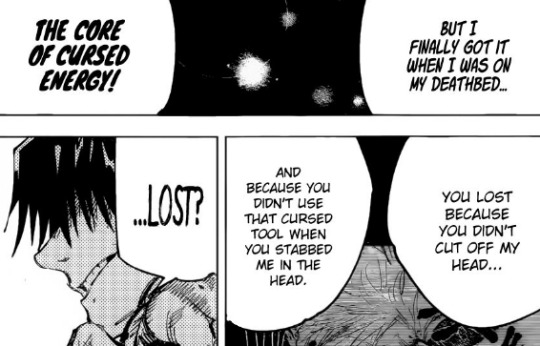
As several people have pointed out before me, Nobara is the only one of the students to feel the core of cursed energy, which is mentioned s Gojo’s feat that allowed him to come back and defeat Toji. Nobara like Gojo, suffered a near fatal wound that put her on the brink of death, but Nitta went into painstaking detail to point out that there wasn’t a zero percent chance of her coming back due to his cursed technique preventing her body from getting any worse. Just like Gojo, her head wasn’t cut off and she wasn’t finished off.
There’s two possible theories I’ve seen to explain what could lead to Nobara coming back, number one her unlocking reversed curse technique similiar to Gojo. Number one the clear parallel to Nobara in the past trio is Shoko. While Megumi is parallled to Gojo and Geto to Yuji. Gojo even says that reversed cursed technique is impossible to expain and has to be figured out intuitively.

Nobara’s technique also has a couple of techniques that closely resemble reverse cursed technique. Resonance connects her to her opponent, she can even use her own body and connect her with her opponent to share their pain together. Considering she connects herself to the opponent’s soul directly to inflict damage on them (how she attacked Mahito’s soul directly), then either using reversed curse technique to heal isn’t that far of a stretch because she is already fighting y directly applying her cursed eenrgy to someone else, she just inflicts negative harm. Gojo explains reverse cursed technique is quite literally just reversing in order to heal.
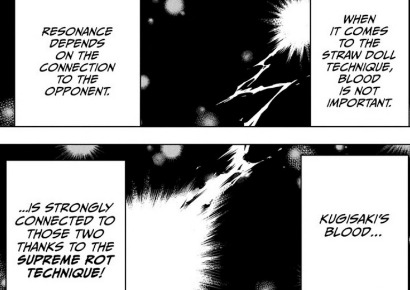
Or, there’s the theory my linked post posited that Nobara herself is going to be shown to be an expert of the soul. This is where I bring alchemy into the equation.

This, is the alchemy triangle.
I’ve explained the significance of the man and woman, small and large circles, square and triangle at some length. For a story, we need to focus on the triangle. In spiritual alchemy, the triangle represents soul, spirit, and body. Heinrich Khunrath helpfully labeled the sides of the triangle in this emblem. In red capital letters you have Anima (soul), Spiritus (spirit), and Corpus (body).
It is ambiguous where cursed energy comes and cursed technique comes from, but we are given multiple references for soul, body and mind. Extremely early on it’s mentioned that cursed energy may come from the brain, later on Mahito is able to change Junpei’s brain around in order to awaken his potential for cursed technique. Much, much later Kenjaku does this en masse to awaken a bunch of potential sorcerers.

Mahito refers to the soul and the body afterwards, completing the triangle. Mahito’s cursed technique specifically manipulates the soul to transform the shape of his body around it. In the world of Jujutsu Kaisen, the soul is definitely something that exists and has form.
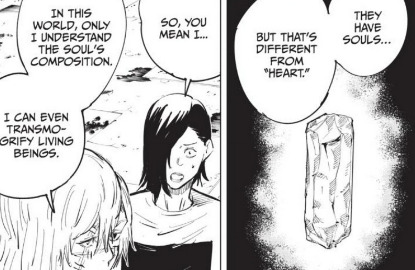

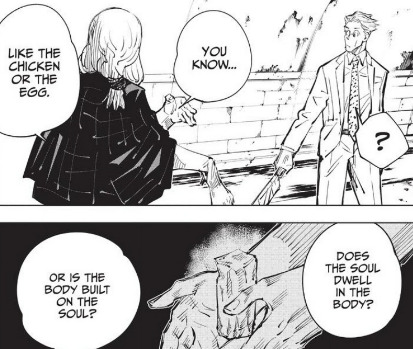
Todo even explicitly names the triangle later on when counselling Yuji, people exists in this world mind, body, and soul and sorcerers are at their strongest when they draw strength with all three are in harmony. Whereas Todo explains that the three of them being seperate and in disharmony makes cursed technique weaker.


So the goal of the triangle, and alchemy at large is to find the harmony between the alchemy triangle, or the three main characters that represent mind, body, soul (or sometimes, mind, body and heart). The Wizard of Oz is the most obvious example of three characters having to find harmony with each other in order to accomplish their goals by the end of the story.
In the Wizard of Oz, Frank Baum used the heart/mind/body triangle in a completely different way. Rather than marking his protagonist, Dorothy, as heart, as you would expect, Baum assigns heart, mind, and body characteristics to her three companions. The Tin Man is in search of a heart, the Scarecrow in search of a brain, and the Cowardly Lion in search of “some nerve,” in other words the courage that Body characters typically lack.
If you were to divide mind, body and soul then you can center the goal of each character of the main trio. Megumi has to find mind, he’s the most cerebral of the trio as the strategist, his entire arc revolves around his ideals (he hypocritically only chooses to save the people he wants too), his biggest flaw is also being inside his own head and refusing to connect with people.
Yuji is obviously body, he shares his body with an intruder Sukuna, he is also out of harmony with Sukuna because Sukuna constantly possesses him to cause harm to the others around him. He only became a sorcerer in the first place because his body was modified the moment he ate the finger. He was also purposefully birthed for the sake of becoming a vessel, which means he was literally created to be a body for Sukuna to inhabit. Body characters are defined by their hunger and desires, Sukuna’s cursed technique literally revolves around cooking, his true form has a giant mouth on his stomach, Yuji has to eat fingers to grow stronger.
That would leave Nobara as the soul, which is where I am going to reference the other post again.
We never seen Gojo referring to Nobara's potential and so it's assumed it's because she's sidelined but there's no reason to say that it's not because her talents might be a major spoiler to whatever True Jujutsu and the Core of Cursed Energy is.
we already know that the power of the soul is something that goes beyond CE. Mahito even remarks all the way back in Chapter 31 that Sukuna should have less CE than Jogo yet his soul is simply on another level. It may be a completely separate power system and part of how Toji and Maki function so well with 0 CE. Their bodies after all can defeat souls.
, In fact, the separation of Sukuna's fingers into 20 is never explained as it's not a requirement seen for any other Special Grade Cursed Object capable of reincarnating like the Death Paintings (they are also mostly human but 1/3(?) curse). We don't actually know why he is different.
The influence souls have on cursed technique are unknown and unexplored too. The necromancer transfigures her grandsons bodies but specifically doesn’t summon the soul, but because Toji has a special body he comes back.
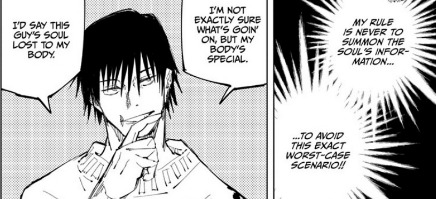
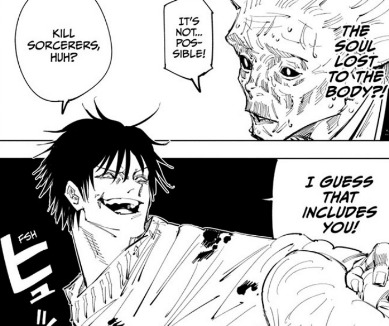
Kenjaku even theorizes that the soul is the body, and the body is the soul therefore their connection influences one another both ways. Which is like... yet another way that Nobara can come back, if the body conforms to the soul and the soul conforms to the body, Nobara being able to manipulate her soul because her CT targets the soul directly could make her change her body enough to come back.

To make an argument with alchemy though, alchemy works by seperating the individual members of the triangle, and then eventually reuniting them. That’s a brief, brief summary of how alchemy works in a story, but basically for the story to be complete the alchemy triangle has to come together. For example, Naruto, Sasuke and Sakura are a similiar alchemy triangle, they spend most of the story seperated and developing on their own, but the story cannot end until the three of them reunite again.
“The triangle symbolizes the tendency of the universe to converge towards the point of unity.”
“Some philosophers maintain the quadrangle is to be reduced to a triangle, that is to body, spirit and soul. These three appear in three colors which precede the redness: the body, or earth, in saturnine blackness; the psirit in lunar whiteness, like water; and the soul or air, in solar yellow. Then the triangle will be perfect, but in its turn it must change into a circle (that is uncharangeable redness).
“Out of man and woman make a round circle and extract the quadrangle from this and from the quadrangle the triangle. Make a round circle and you will have the philosopher’s stone.”
The goal of alchemy is to form the philosopher’s stone, or essentially reach the endpoint of the story. The “man and woman” angle is also important. Remember, Nobara and Yuji have been depicted fighting together three times, the first time they were in disharmony because they just met, the second time they were in harmony after developing their bond as sorcerers and took on the death painting sibs together, the third time they were in disharmony again and they even seperated with Nobara’s “Death”. Alchemy would require the man and the woman coming together again at the end of the story (this doesn’t even specifically have to be romantic, just as symbols, Nobara and Yuji black flashed together they have a lot of potential for harmony).
Whether or not you ship Sasuke and Sakura (PLEASE THIS iSN’T SHIpS I DONT EVEN SHIP THEM), the story also follows the formula of alchemy, Sasuke and Sakura are seperated for the majority of the story developing on their own and reforging themselves but the story cannot end until man and woman are brought together in a round circle.
Therefore if Jujutsu Kaisen is an alchemical story, of mind, body and soul and cursed technique is at it’s strongest when these three elements are in harmony with each other, then the story can’t end unless the trio is repaired and Megumi (Mind), Yuji (Body) and Nobara (soul) are brought together once more.
#metasks#nobara kugisaki#mai zenin#maki zenin#megumi fushiguro#yuji itdaori#jujuts kaisen#jujutsu kaisen meta#jjk meta#jujutsu kaisen theory
72 notes
·
View notes
Text
Attack on Titan season 4 part 2 episode 9:
1) Magath's appeal to 2000 years of oppression is comparatively weightless not only because he doesn't know (or care) it was caused by shitty leadership enslaving foreign people, but because it ignores actually relevant present circumstances.
It's not unfounded because the consequences are still there and felt in the present, but blaming Italy for what the Roman Empire did has a lot less weight than blaming them for what the fascist movement did and even then circumstances change and as they change, new conflicts arise dependant on context.
2000 years of history shouldn't be relevant when a nuke is breathing down your neck and you need to act now.
But that history also is actually used as an excuse to do bad, keeps people from acting and most importantly needs to be understood to be learned from, so it should be addressed.
2) Man, the desire to talk is such a true and real component of the conversation in this episode.
Several conflicts in human history would've been much less destructive if the 'force of good' in the conflict wouldn't have been so soft-hearted.
It's like the counter-balance to the actions in the previous episode and Annie points this out perfectly.
If you can't reason with Eren, what then?
In this case, the hesitation comes from personal ties with Eren.
In other cases, it's faith in humanity that things can be resolved by talking or fear of the enemy.
And we've seen the positive and negative consequences to all of these elements in this series.
If Annie and co would've talked during training, perhaps Paradis would've learned of their circumstances before Eren was worn down by his experiences and Erwin was killed. Perhaps then, the more slower approach of building understanding and more allies would've been possible to happen.
There are multiple times when characters trying to reason or hesitating with the enemy have all lead to creating an advantage for the enemy, especially if you look at them in a vacuum.
When Annie didn't kill Armin.
When Eren hesitated fighting Annie.
There was Hange and Jean hesitating to immediately kill Reiner when he was captured.
There's even smaller ones like Jean hesitating to kill a member of the MP attacking the scouts.
But it all made sense from the perspective of their characters.
But the coup lead by Erwin mostly consisted of very smart politics and minimal sacrifices.
And diplomacy is what brought together the current alliance. It has bargaining chips and circumstances backing it, but it worked.
Finally, as said, there was the aspect of people succumbing to fear, which the Jaegerist movement demonstrates in this arc, but has been the main element the story has been emphasising when fighting oppression since the start.
At first it's fear in the face of Titans, then it's fear in face of people who are Titans, then it's fear in the face of an oppressive regime and then it's all put together.
Fear is probably also the biggest motivator in this series.
Nobody wants to fight the Titans because they are scared to die.
Eren is scared everyone he cares about will die.
And then many other elements are thrown in the mix to make a war and the conquest of a nation happen.
Many things can give a country motivation to invade another, to name a few, perhaps its strategic location, maybe resources on the land or even just principles of conquest and the need for greatness.
There are plenty of excuses to draw from: in this story's case it's the standard claim of being attacked first and 'destroying the devils on the island to save the world'.
For a war to happen a country spurs its people with some form of propaganda.
And for that war to be won, hesitation of your enemy because of naivete or fear is necessary, just as much as economic weakness.
In general all of these elements can have so many aspects and nuances to them, I'll just leave what I listed here in relation to this story.
I think these are all great things to bring up because many times people don't really think about all of the bad in people being human, too.
Wars happen because people are people.
This story is empathic to these bad things in humanity as well as the good and I think for this section of the episode, Annie's quote before the events in Stohess is the most appropriate:
"It takes great courage to go against the flow. I want the people swept along the flow to be considered human, too."
Many read this as her trying to excuse her actions, but Annie has made it really clear she doesn't really care about herself that much: she has pretty strong self-loathing backing her reasonings.
In hindsight especially, I think it's about not even necessarily empathising with her, but understanding the position the Eldians in Marley are in.
As human as the bad parts of humanity are, they also shouldn't be something to hide behind or excuse or hand-wave.
That's the tightrope to walk when humanising the bad parts of humanity.
And I think this series generally does a pretty good job with this – and ultimately this is one of the reasons I love this story with all of the issues I take with it.
I just find any story with that kind of framing interesting. Instead of giving bad and good qualities the story values, it says all of it is part of the human experience.
3) I think, once again, this episode also does a pretty good job of balancing perspectives out.
Magath and the Marleyans are given a word and their flaws are listed.
The Eldians are given a word and their flaws are listed, too.
Both of which Yelena dishes out happily and then is also given a few words by Jean.
Pointing out possible self-righteousness is very good in my eyes – it's another separate aspect of the alliance to address because no matter the reason, murder is not okay.
If the story didn't point out this aspect and give that humility to the perspective of the alliance, it could justify Eren pretty easily.
It also balances out the 'save the world' element last episode ended up on.
This is why I don't understand the outrage from certain people about that scene. It's exaggerated to be a point of positivity, but is immediately taken down a notch by the narrative in the following material, which asks, okay, that's well and good, but what does 'saving the world' actually entail here?
The fact of the matter is that almost everyone around that campfire has killed someone, regardless of what their reasoning (and yes, some of them did it in self-defense and absolutely were victims, like pretty much all of the Paradis Eldians), but the important part here is that getting high and mighty about justice could lead to killing that isn't about doing the right thing or self-defense.
And I think Eren is that example. At this point what he is doing is just indiscriminate murder no matter how much it is for his friends.
I said I loved the character and thematic material in this material the most when it first came out and I think, again, this chapter being essentially made into a single episode helped a lot with the pacing of it.
It helped the feelings stew and for you to stay in the moment much more and I think that's probably the biggest flaw of this final stretch of the story.
It often doesn't let you sit in the feelings of a moment.
I'd argue this episode made good material into pretty great material, even.
Yes, much of it was spent with images of trees and very limited animation, but I think from the directorial standpoint focusing on the more abstract helped to focus on the nuances and feelings of the writing.
It's limited animation used in a very effective way in my eyes and as much as the ending of the Evangelion TV series frustrates me, it used this type of directing to create a similar effect.
It just wasn't as effective to me because the dialog was a lot more muddled.
I hope they do this with the ending – add a few points of directorial nuance (like when the tension in a scene rose, the editing became more haphazard) and give some scenes more time to breathe.
I think the ending also needs some additions in the writing itself, but even altering some of the pacing would make a big difference when I look at how much of a difference this episode had just by having a specific style of direction behind it.
Yeah, I honestly kind of actually loved this episode and I did not expect this at all.
38 notes
·
View notes
Text
Rusty Quill Gaming, Pt. 2
So, I've finished the Paris and Prague arcs of of the story, and so far, I'm blown away. I've laughed, I've nearly cried, and I am emotionally involved, but can't quite pinpoint exactly when that happened.
I went back last night and relistened to the episode set on Amelia Earhart's airship (Harrison Campbell!) and, while I know it was a chance for the characters to rest up and catch their breaths, there were a few things about it that caught my attention.
First of all, Sasha. Despite everything she's been through, she is kind. She stopped, hunkered down, and spent a while just talking to a mostly-frozen stranger who was afraid to go back to his quarters because he was being hunted...
...by Bertie. Having finished the Prague arc, I can definitely say without hesitation that Bertrand MacGuffingham is trash. All this episode did was highlight that he was a selfish asshole with no regard for anyone except himself. He deserved what he got both here and later on.
Hamid, meanwhile, turned out to be a literary snob. Not so much a problem, but he really should have kept his more vicious criticism to himself.
As for Zolf, his angsting over whether or not to go talk to his favorite author was cute, especially when the half-frozen guy on the deck that Sasha was talking to turned out to be him. And the fact he was in his underwear the entire episode was kind of hilarious.
But what I really want to talk about is his meltdown.
Up until now we've seen him looking after his people - keeping them together, having their backs in fights, and healing their wounds when they get hurt. There's been conflict - Hamid's naivete and Sasha's awkwardness being issues at varying points, and Bertie's existence being a constant problem - but there's never been a major explosion until now.
What got me about it was that Zolf said that Bertie seemed to be out to hurt everything and everyone he cared about or loved. And I wonder if Zolf realized the implications of what he was saying to Sasha, or if he was just so angry that his brain-to-mouth filter just disengaged.
If he did, part of the reason he left might have been that he didn't want to deal with the fallout of admitting that he cares about (or loves) Sasha and Hamid.
If he didn't, his reasons for leaving - and for firing Bertie - were exactly what he said. He was sick of Bertie's shit, and he was afraid he was losing himself.
Either way, if he had stayed and been with them at the opera house, if Kafka hadn't killed Bertie, Zolf would have, just because of what he did to Hamid and his sister.
#rusty quill#rusty quill gaming#zolf smith#sasha rackett#hamid al tahan#hamid saleh haroun al tehan#bertie macguffingham#rqg#harrison campbell#rqg 63
63 notes
·
View notes
Text
everything feyre ever stood for in the first two books...destroyed, alongside her personality. no spark, no flame, not even a peep of her defiance + independence + passion, and above all else that was the most special thing abt her, her human heart. mourn it for you'll never see it again. she shot a wolf unprovoked + marched into the depths of a mountain out of naivete, or out of love. bravery and foolishness walk a fine line. now she's satiated by meaningless titles and the way she tells stories rather than the actions done
speaking of personalities, tamlin + rhysand? copout cheap and gone forever. tamlin didn't need to become an eternal punching bag of the fandom and unrealistic villain, he was becoming a grating force all by himself born of his own ptsd. a normal, mature reason for the character dynamics to shift. rhysand always had ulterior plans in motion, his arc into heroism was always heavily foreshadowed and needn't have come at the almost cartoonish demise of tamlin. feyre could've chosen him merely bc as they all changed, he was what she needed, not because tamlin became the embodiment of an attack on her very sense of self. not to mention tamlin + rhysand's rich shared lore + history, informing no small part of the high lords they eventually became. there was hatred there and there was violence but there was respect and pity and even affection between them before. they were parallel lives from the very start. no one will know the other like the two of them. to stand across from a friend turned enemy overnight, bathed in the blood of each other's families and the glow of newfound responsibilities like no other? that means nothing, holds no significance other than childish pranks + occasional quarreling + baiting? and at that only ever when related to a woman?
the triangle of love and development between tamlin + lucien + feyre wasn't required to fall in order to build a foundation for the inner circle + rhysand's family. as the ic's groundwork grew, so too should have the cracks of trauma warping tamlin + lucien + feyre in a way that still remembered their inequivocable willingness to die for another in bk 1. all you had to say was being under the mountain changed you. the trauma informed the person you are now and it was not the same person i fell in love with. knowing what i know now, even if you were the same, the trauma informed me and therefore i am not, and i could not love this life and this version you offer me. none of us escaped this evil and we each carry a shard of it with us everywhere we go. i hate you. i love you. i'm sorry. time goes on
acotar as a whole always stood out for being a series to face the nuanced histories and trauma of people who have lived an awfully long time and learned to carry it. to reduce their choices + pasts to a black + white showdown, where good is good and bad is bad and only one definition exists for all, to wipe it all away, disrespectful honestly + disingenuous
all of these complexities could've coexisted in peace, accepted, and tragic in a different way, the tragedy of growth + natural progression, of people growing apart in bitterness but reluctant understanding, not childlike blind fury + pettiness. they could've all coexisted in a different way, but nonetheless every component alive, and honored. instead, all of it wiped out as if it never existed at all, as if none of it mattered. none of it even mattered...
when i catch u sjm, sarah when i CATCH U
#head in hands.#devastation not a word great enough for the loss i feel rn#k#acotar#acomaf#lucien vanserra#feyre archeron#rhysand#tamlin
3 notes
·
View notes
Text
Guillermo del Toro's Pinocchio (2022, dir. Guillermo del Toro) - review by Rookie-Critic

Guillermo del Toro's Pinocchio is one of the most gorgeous pieces of claymation artistry I have ever seen. Purely from an artistic standpoint this movie is perfect and Guillermo del Toro should be incredibly proud of what he was able to accomplish in an art form that he has never really worked in before. The motion is smooth as can possibly be, the faces are expressive, and the environments are vibrant and full of life. Everything feels very fleshed out and alive throughout the entire movie. Characters' personalities come out just as much in their gait, facial movements, and the way their mouths move around their words as it does in the vocal performances themselves. There's not a ton that I can say about Pinocchio's animation because it's just perfect. The same goes for the cast and their performances. Newcomer Gregory Mann was a perfect cast for the titular character, and brings all the childlike wonder and naivete to the little wooden boy that the story demands and even more. David Bradley, Ewan McGregor, and Christoph Waltz all deserve high praise for their work in the movie and a very special shout out should go to Cate Blanchett for taking on a very no frills, minimalist animal role that would normally go to someone like Frank Welker, Dee Bradley Baker, or Alan Tudyk, and making it very unique and one of the more memorable parts of the movie, of which their are many.
The biggest change from the Pinocchio we all are probably familiar with (Disney, it's the Disney one) is that this time del Toro has set the story in World War II, fascist, Mussolini-led Italy, and has made the story largely about said fascism as well as death. We still hit a lot of the same story beats: Volpe still tricks Pinocchio into a contract, the whale (or in this movie's case, a dogfish) still makes an appearance where you-know-what happens, and Jemeny (or Sebastian J. Cricket in this version) is still tasked with being Pinocchio's conscience, although it's not said in those exact words. While del Toro's themes are prevalent and his message is clear, it feels like he's holding himself back. The war is portrayed as horrible, but outside of one or two horrible things that happen we're largely delegated to view it from afar, even when Pinocchio is presumably in the thick of it. The whimsical nature of the movie never falters to the film's detriment. I've heard del Toro say this is the last film in a thematic trilogy with his earlier films The Devil's Backbone and Pan's Labyrinth (the former of which is my personal favorite of his), and I think openly comparing Pinocchio to those two films is a mistake because it highlights how massively tame this is by comparison. This takes place in World War II Italy and we barely feel it. It just seems so strange to me that del Toro would choose to be reserved now when that's never been his inclination before. Even Geppetto, who has more reason to be absolutely cripplingly angry at Mussolini and the fascist government, almost seems like he views war as just "bad." More beaten into submission than anything else (which isn't inherently an invalid way to go, but I don't think it serves the story very well).
I also feel like we could have spent a little more time in just about any part of the story to really make the journey feel more full and Pinocchio's arc feel more earned, and no part of this is felt more strongly than the time Pinocchio spends with Death (yes, the capital D is intentional). I found those moments and those conversations to be the most fascinating part of the movie, but ultimately it doesn't really lead to anything and I wanted it to feel more meaningful. Again, we don't spend enough time anywhere to really make anything seem that meaningful. Even the whale feels so out of place in this movie that otherwise keeps itself very tied to the war; I almost feel that the idea of the whale and what it means to that part of Pinocchio's journey could have been repurposed as something else, something a little more in line with the film's main themes. I could also go into how I don't think Sebastian serves the film at all, but I have that complaint about the "cricket" character in any version of the story, so I don't really hold that against this movie specifically.
Don't let all my rambling make you think that I didn't still adore this movie. I'm hard pressed to think of a Guillermo del Toro movie that I don't at least like (I wasn't a huge fan of Crimson Peak, but that's about it), and Pinocchio is no different, it may just be more in the middle of the pack.
Score: 8/10
Currently streaming on Netflix.
#Guillermo del Toro's Pinocchio#Pinocchio#Pinocchio 2022#Guillermo del Toro#Gregory Mann#David Bradley#Ewan McGregor#Christoph Waltz#Cate Blanchett#Finn Wolfhard#Ron Perlman#Tilda Swinton#Tim Blake Nelson#John Turturro#Burn Gorman#Tom Kenny#film review#movie review#2022 films
5 notes
·
View notes